Fundamentals of Human Resource Management 11e Chapter 3 Equal Chance Employment Introduction
VerifiedAdded on 2022/06/02
|41
|2607
|16
PowerPoint Presentation
AI Summary
Other federal laws regulating employment State and municipal laws may go beyond federal laws Fundamentals of Human Resource Management 11e 2 Laws Affecting Discriminatory Practices The 1964 Civil Rights Act Outlawed racial segregation and discrimination in employment, public facilities, and education Title VII covers hiring, promotion, dismissal, benefits, compensation or any other terms, conditions, or privileges based on: Race Religion Color Organizations must have at least 15 employees to be covered.
Contribute Materials
Your contribution can guide someone’s learning journey. Share your
documents today.
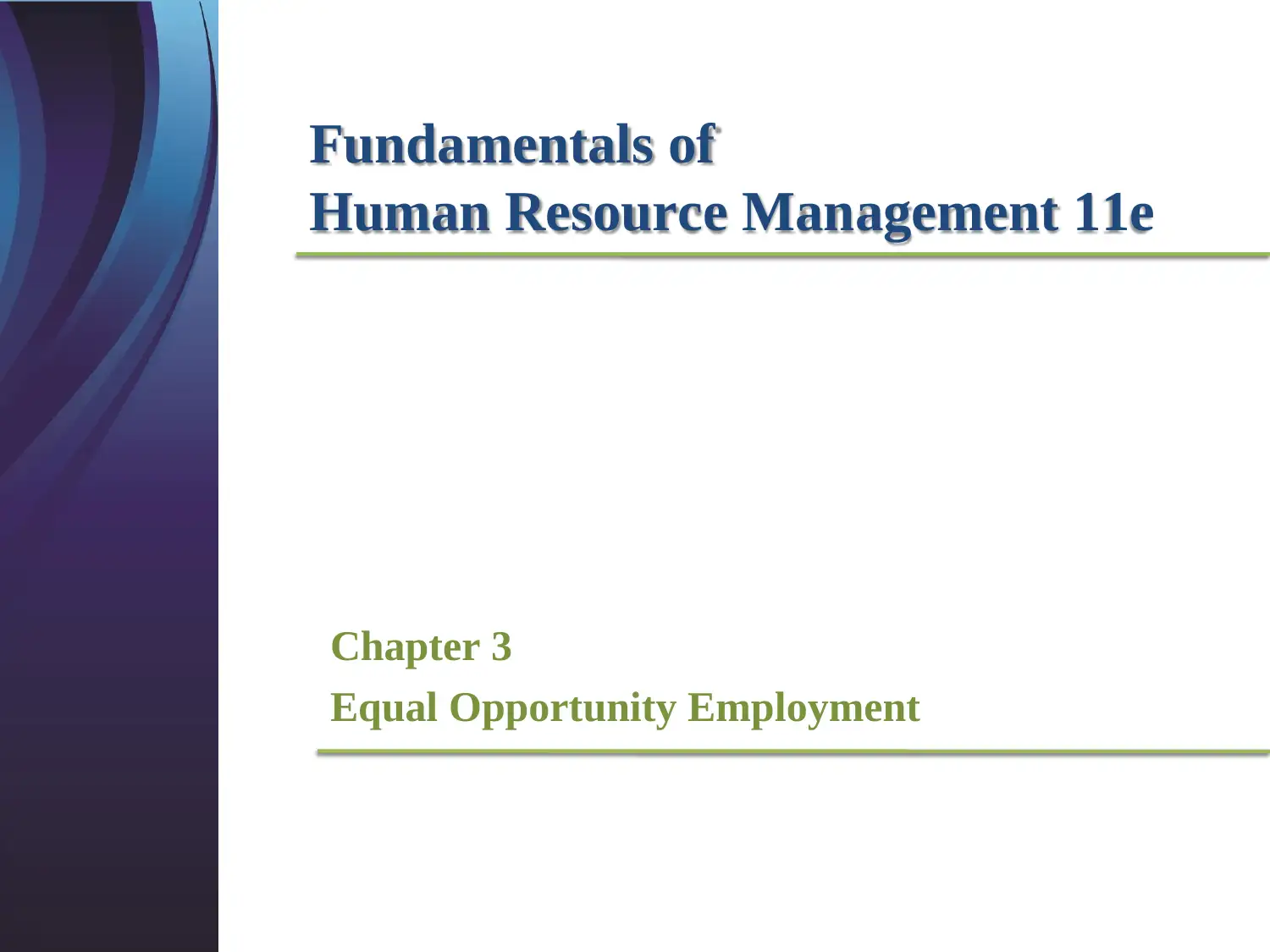
Fundamentals of
Human Resource Management 11e
Chapter 3
Equal Opportunity Employment
Human Resource Management 11e
Chapter 3
Equal Opportunity Employment
Secure Best Marks with AI Grader
Need help grading? Try our AI Grader for instant feedback on your assignments.
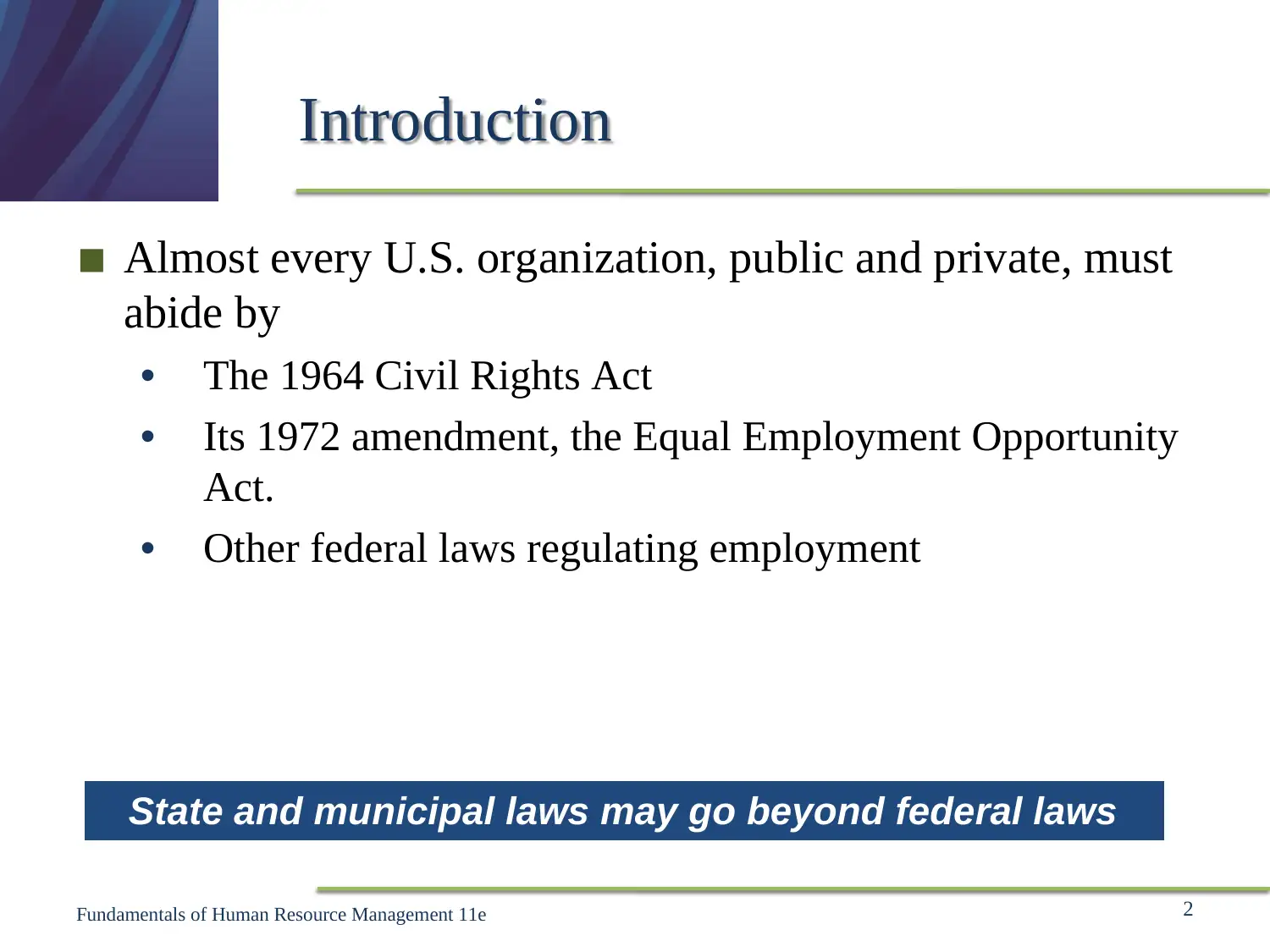
▪ Almost every U.S. organization, public and private, must
abide by
• The 1964 Civil Rights Act
• Its 1972 amendment, the Equal Employment Opportunity
Act.
• Other federal laws regulating employment
Introduction
2Fundamentals of Human Resource Management 11e
State and municipal laws may go beyond federal laws
abide by
• The 1964 Civil Rights Act
• Its 1972 amendment, the Equal Employment Opportunity
Act.
• Other federal laws regulating employment
Introduction
2Fundamentals of Human Resource Management 11e
State and municipal laws may go beyond federal laws
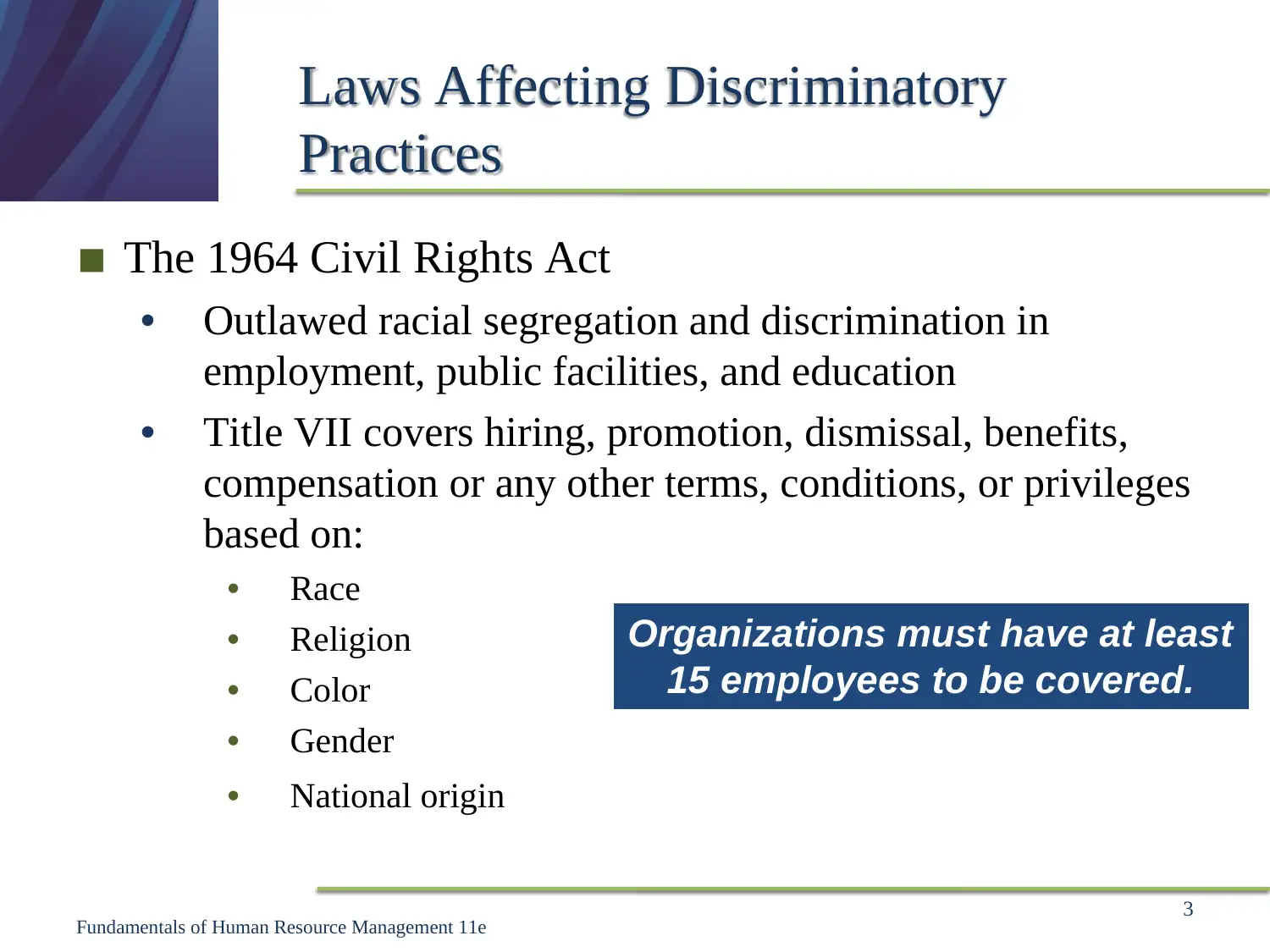
Laws Affecting Discriminatory
Practices
Fundamentals of Human Resource Management 11e 3
▪ The 1964 Civil Rights Act
• Outlawed racial segregation and discrimination in
employment, public facilities, and education
• Title VII covers hiring, promotion, dismissal, benefits,
compensation or any other terms, conditions, or privileges
based on:
• Race
• Religion
• Color
• Gender
• National origin
Organizations must have at least
15 employees to be covered.
Practices
Fundamentals of Human Resource Management 11e 3
▪ The 1964 Civil Rights Act
• Outlawed racial segregation and discrimination in
employment, public facilities, and education
• Title VII covers hiring, promotion, dismissal, benefits,
compensation or any other terms, conditions, or privileges
based on:
• Race
• Religion
• Color
• Gender
• National origin
Organizations must have at least
15 employees to be covered.
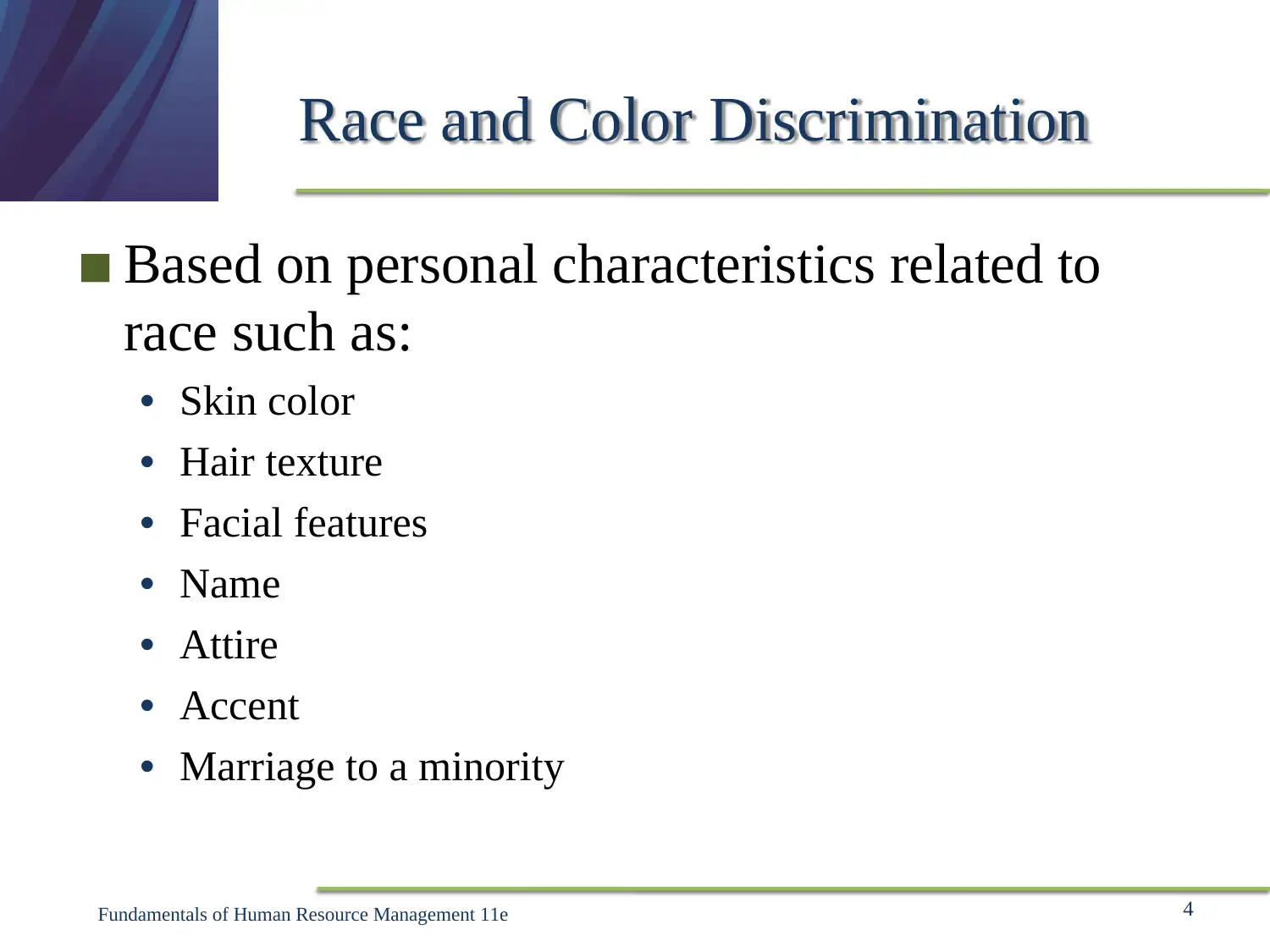
▪ Based on personal characteristics related to
race such as:
• Skin color
• Hair texture
• Facial features
• Name
• Attire
• Accent
• Marriage to a minority
Race and Color Discrimination
4Fundamentals of Human Resource Management 11e
race such as:
• Skin color
• Hair texture
• Facial features
• Name
• Attire
• Accent
• Marriage to a minority
Race and Color Discrimination
4Fundamentals of Human Resource Management 11e
Secure Best Marks with AI Grader
Need help grading? Try our AI Grader for instant feedback on your assignments.
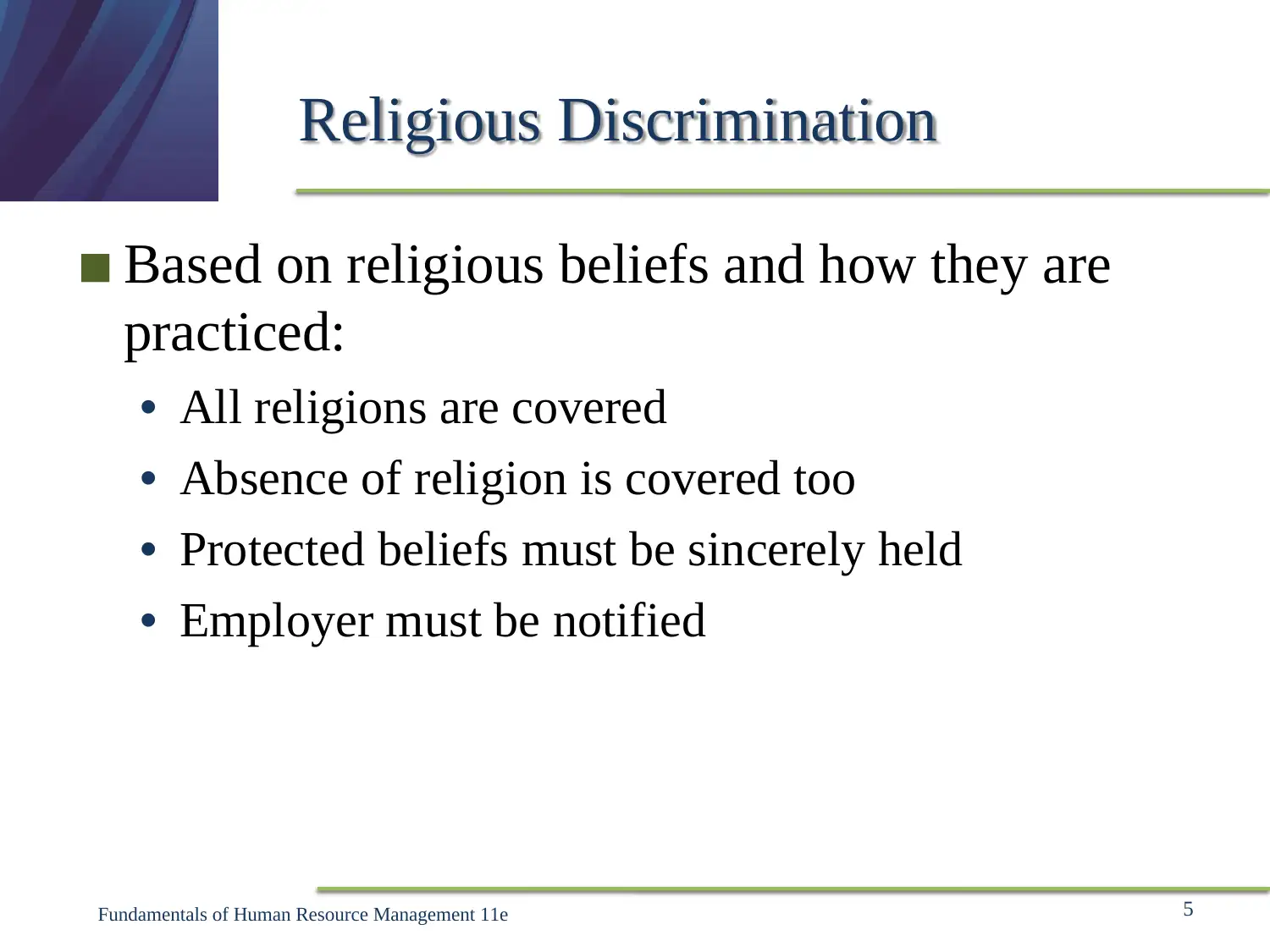
▪ Based on religious beliefs and how they are
practiced:
• All religions are covered
• Absence of religion is covered too
• Protected beliefs must be sincerely held
• Employer must be notified
Religious Discrimination
5Fundamentals of Human Resource Management 11e
practiced:
• All religions are covered
• Absence of religion is covered too
• Protected beliefs must be sincerely held
• Employer must be notified
Religious Discrimination
5Fundamentals of Human Resource Management 11e
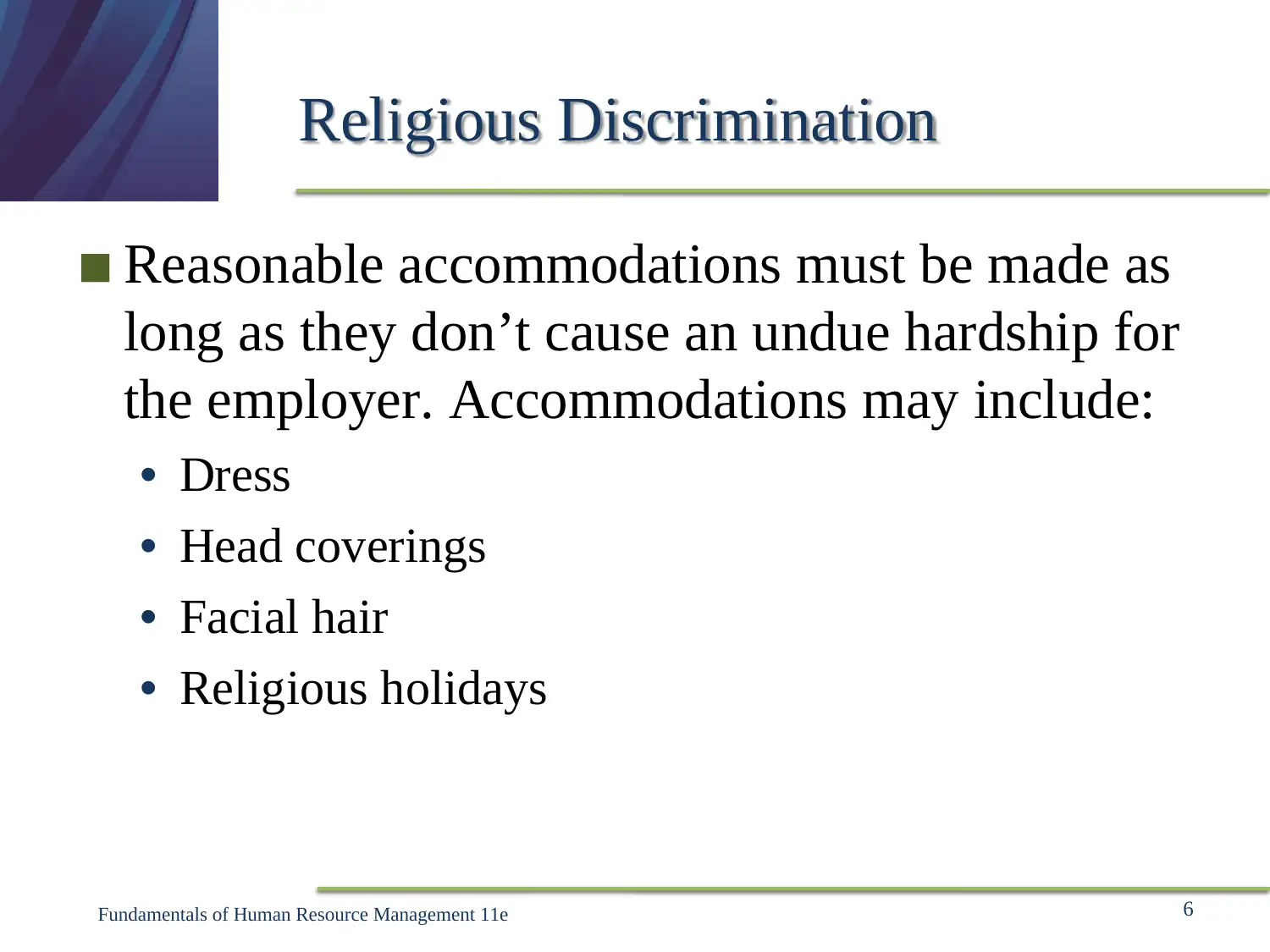
▪ Reasonable accommodations must be made as
long as they don’t cause an undue hardship for
the employer. Accommodations may include:
• Dress
• Head coverings
• Facial hair
• Religious holidays
Religious Discrimination
6Fundamentals of Human Resource Management 11e
long as they don’t cause an undue hardship for
the employer. Accommodations may include:
• Dress
• Head coverings
• Facial hair
• Religious holidays
Religious Discrimination
6Fundamentals of Human Resource Management 11e
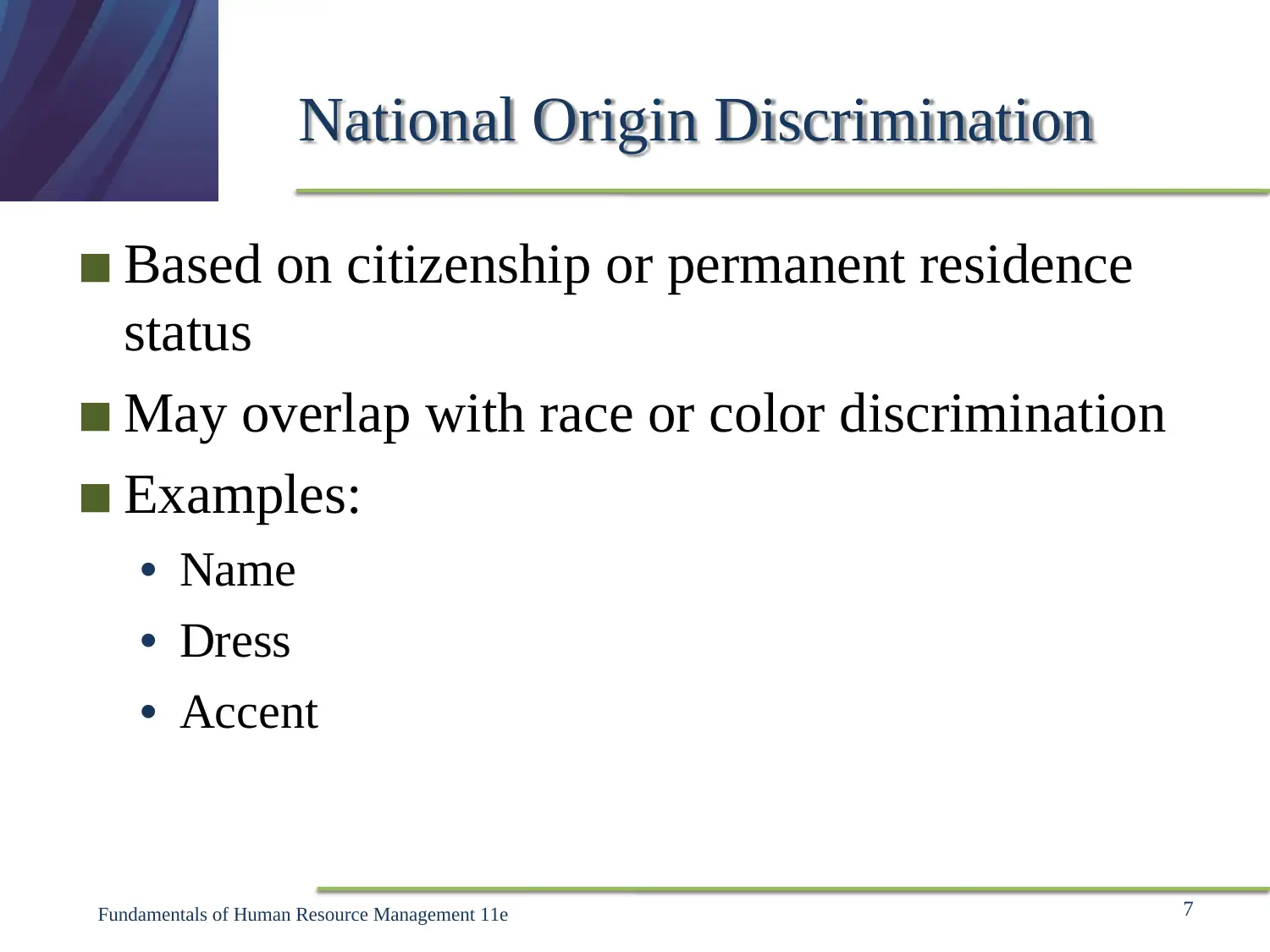
▪ Based on citizenship or permanent residence
status
▪ May overlap with race or color discrimination
▪ Examples:
• Name
• Dress
• Accent
National Origin Discrimination
7Fundamentals of Human Resource Management 11e
status
▪ May overlap with race or color discrimination
▪ Examples:
• Name
• Dress
• Accent
National Origin Discrimination
7Fundamentals of Human Resource Management 11e
Paraphrase This Document
Need a fresh take? Get an instant paraphrase of this document with our AI Paraphraser
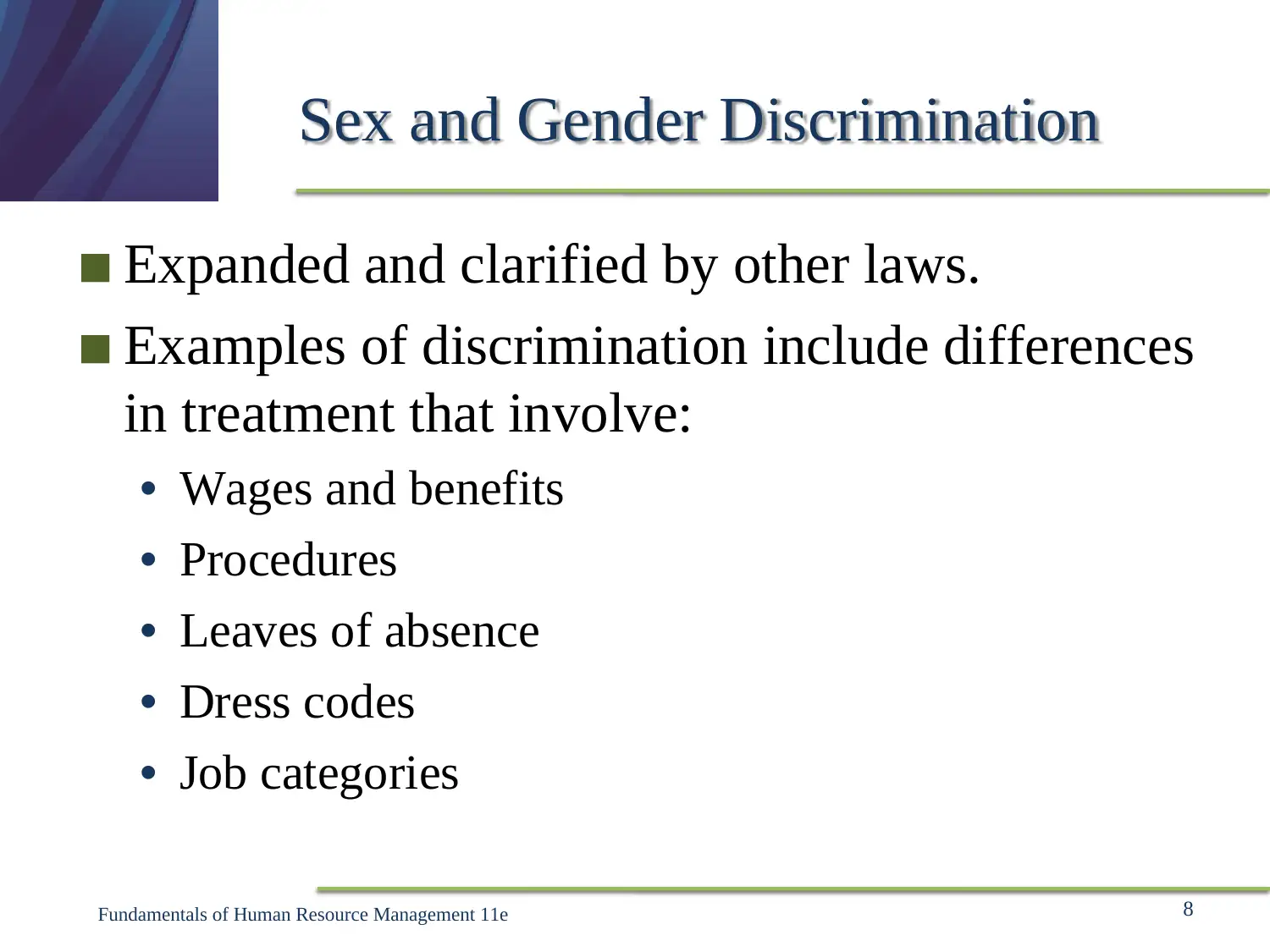
▪ Expanded and clarified by other laws.
▪ Examples of discrimination include differences
in treatment that involve:
• Wages and benefits
• Procedures
• Leaves of absence
• Dress codes
• Job categories
Sex and Gender Discrimination
8Fundamentals of Human Resource Management 11e
▪ Examples of discrimination include differences
in treatment that involve:
• Wages and benefits
• Procedures
• Leaves of absence
• Dress codes
• Job categories
Sex and Gender Discrimination
8Fundamentals of Human Resource Management 11e
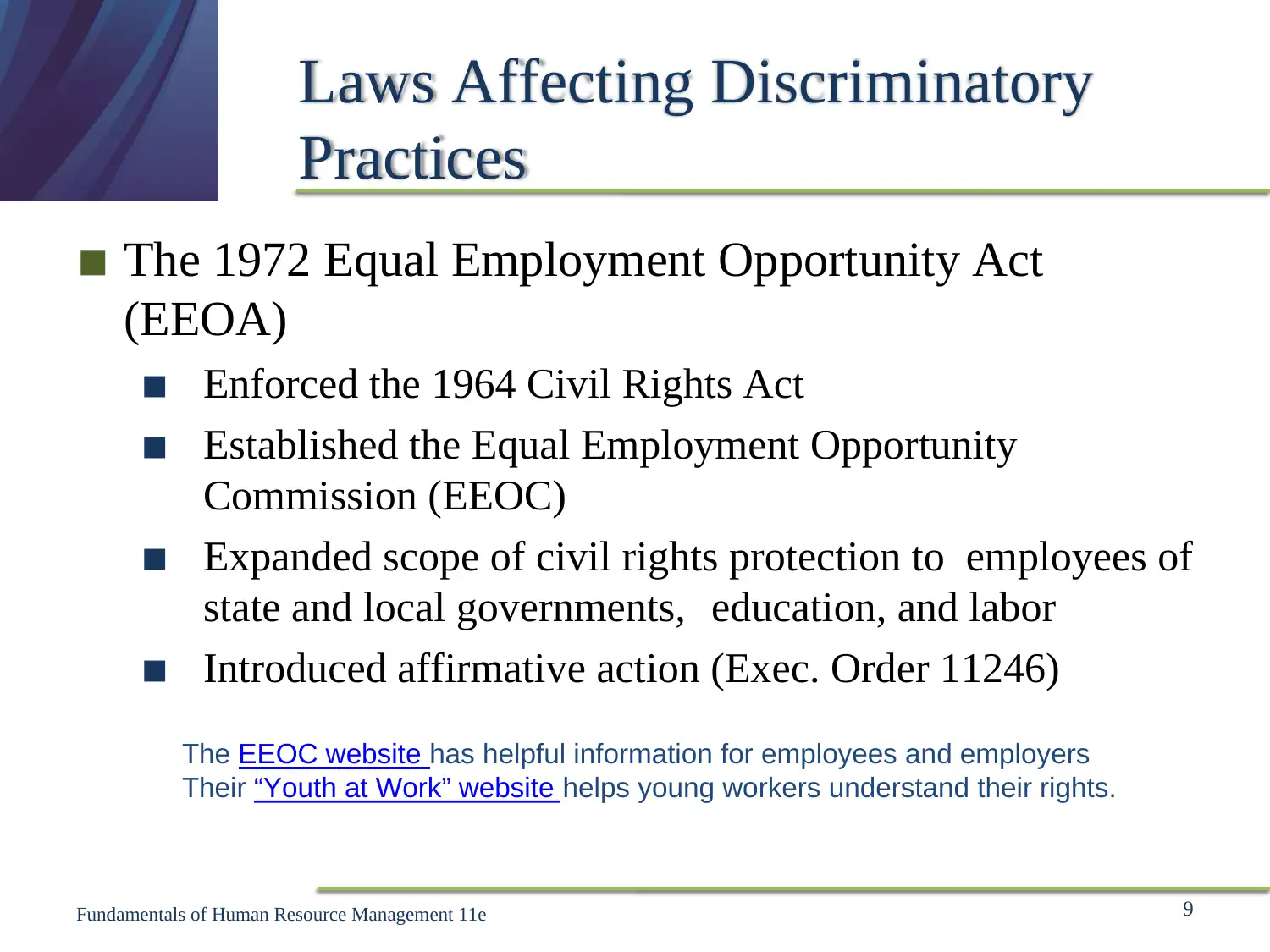
▪ The 1972 Equal Employment Opportunity Act
(EEOA)
▪ Enforced the 1964 Civil Rights Act
▪ Established the Equal Employment Opportunity
Commission (EEOC)
▪ Expanded scope of civil rights protection to employees of
state and local governments, education, and labor
▪ Introduced affirmative action (Exec. Order 11246)
Laws Affecting Discriminatory
Practices
9Fundamentals of Human Resource Management 11e
The EEOC website has helpful information for employees and employers
Their “Youth at Work” website helps young workers understand their rights.
(EEOA)
▪ Enforced the 1964 Civil Rights Act
▪ Established the Equal Employment Opportunity
Commission (EEOC)
▪ Expanded scope of civil rights protection to employees of
state and local governments, education, and labor
▪ Introduced affirmative action (Exec. Order 11246)
Laws Affecting Discriminatory
Practices
9Fundamentals of Human Resource Management 11e
The EEOC website has helpful information for employees and employers
Their “Youth at Work” website helps young workers understand their rights.
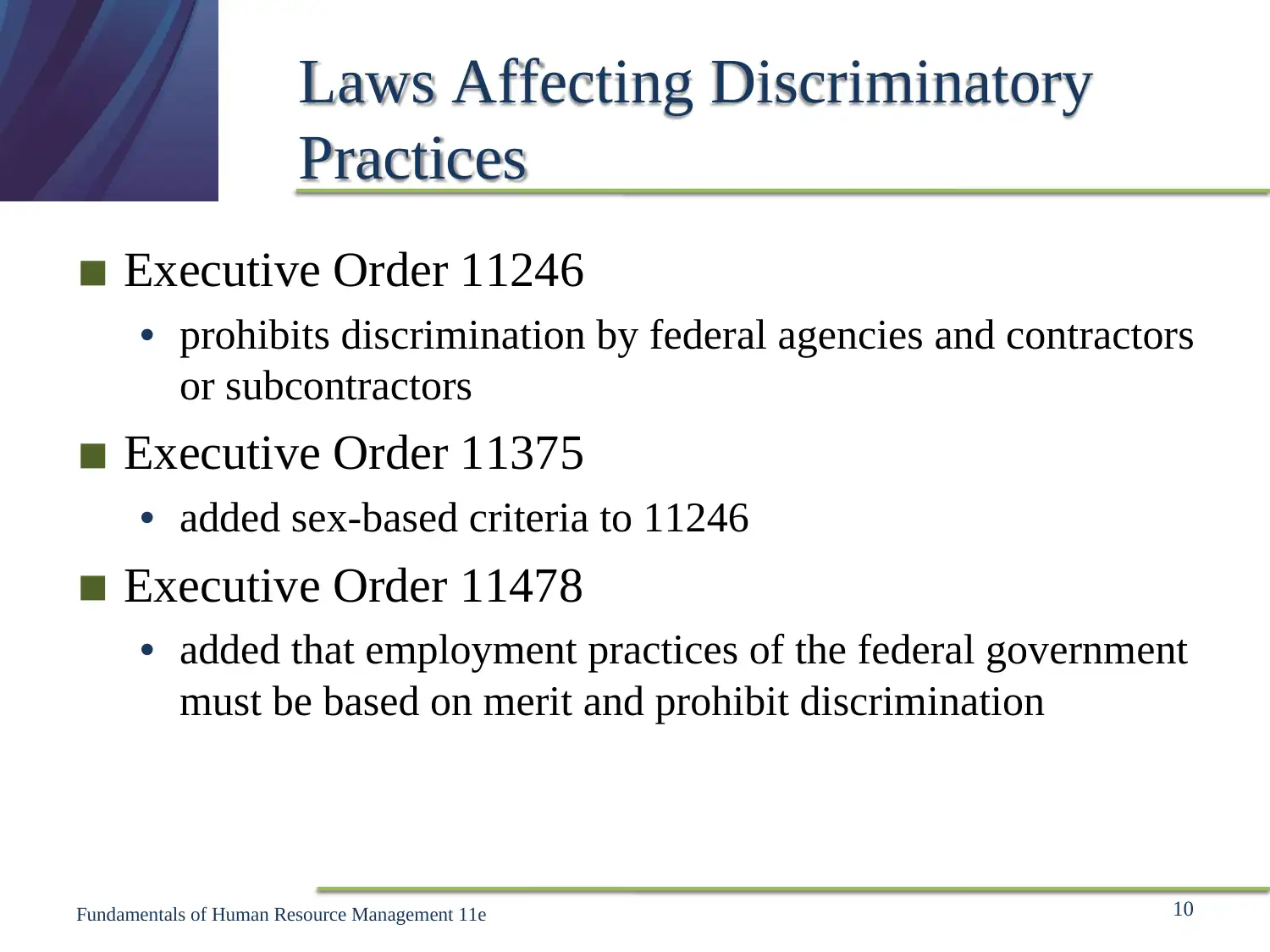
Laws Affecting Discriminatory
Practices
10Fundamentals of Human Resource Management 11e
▪ Executive Order 11246
• prohibits discrimination by federal agencies and contractors
or subcontractors
▪ Executive Order 11375
• added sex-based criteria to 11246
▪ Executive Order 11478
• added that employment practices of the federal government
must be based on merit and prohibit discrimination
Practices
10Fundamentals of Human Resource Management 11e
▪ Executive Order 11246
• prohibits discrimination by federal agencies and contractors
or subcontractors
▪ Executive Order 11375
• added sex-based criteria to 11246
▪ Executive Order 11478
• added that employment practices of the federal government
must be based on merit and prohibit discrimination
Secure Best Marks with AI Grader
Need help grading? Try our AI Grader for instant feedback on your assignments.
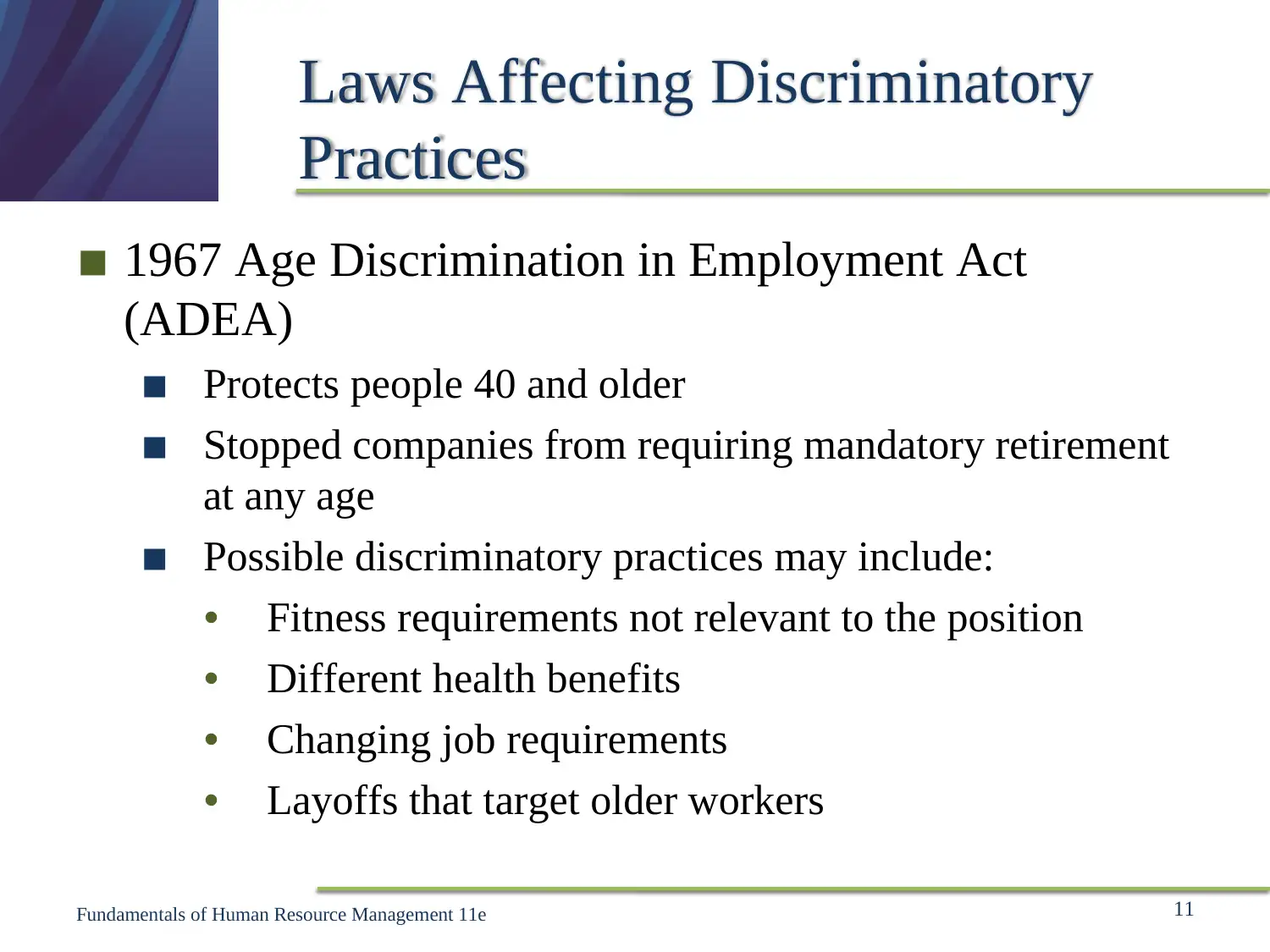
Laws Affecting Discriminatory
Practices
Fundamentals of Human Resource Management 11e 11
▪ 1967 Age Discrimination in Employment Act
(ADEA)
▪ Protects people 40 and older
▪ Stopped companies from requiring mandatory retirement
at any age
▪ Possible discriminatory practices may include:
• Fitness requirements not relevant to the position
• Different health benefits
• Changing job requirements
• Layoffs that target older workers
Practices
Fundamentals of Human Resource Management 11e 11
▪ 1967 Age Discrimination in Employment Act
(ADEA)
▪ Protects people 40 and older
▪ Stopped companies from requiring mandatory retirement
at any age
▪ Possible discriminatory practices may include:
• Fitness requirements not relevant to the position
• Different health benefits
• Changing job requirements
• Layoffs that target older workers
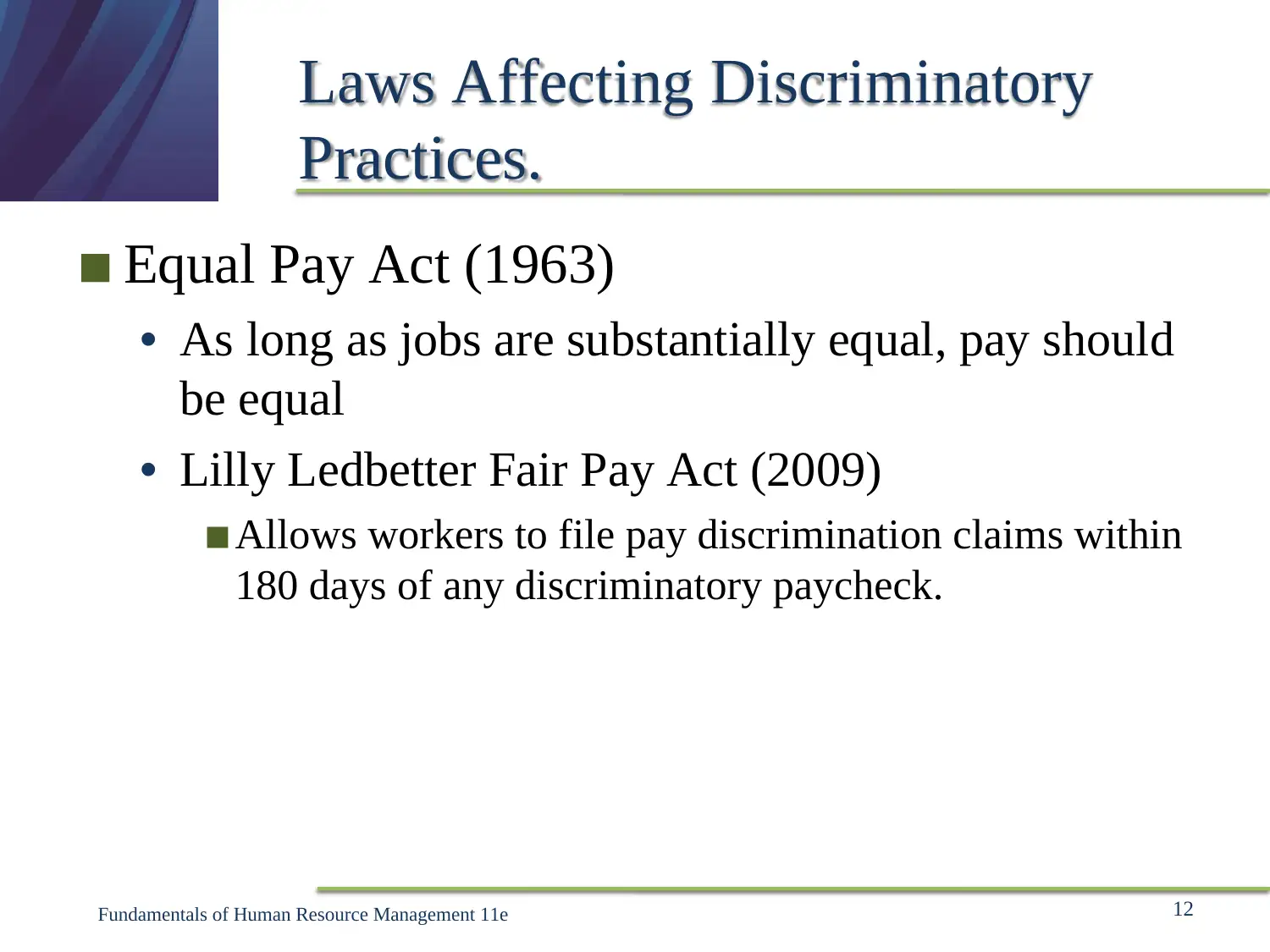
▪ Equal Pay Act (1963)
• As long as jobs are substantially equal, pay should
be equal
• Lilly Ledbetter Fair Pay Act (2009)
▪Allows workers to file pay discrimination claims within
180 days of any discriminatory paycheck.
Laws Affecting Discriminatory
Practices.
12Fundamentals of Human Resource Management 11e
• As long as jobs are substantially equal, pay should
be equal
• Lilly Ledbetter Fair Pay Act (2009)
▪Allows workers to file pay discrimination claims within
180 days of any discriminatory paycheck.
Laws Affecting Discriminatory
Practices.
12Fundamentals of Human Resource Management 11e
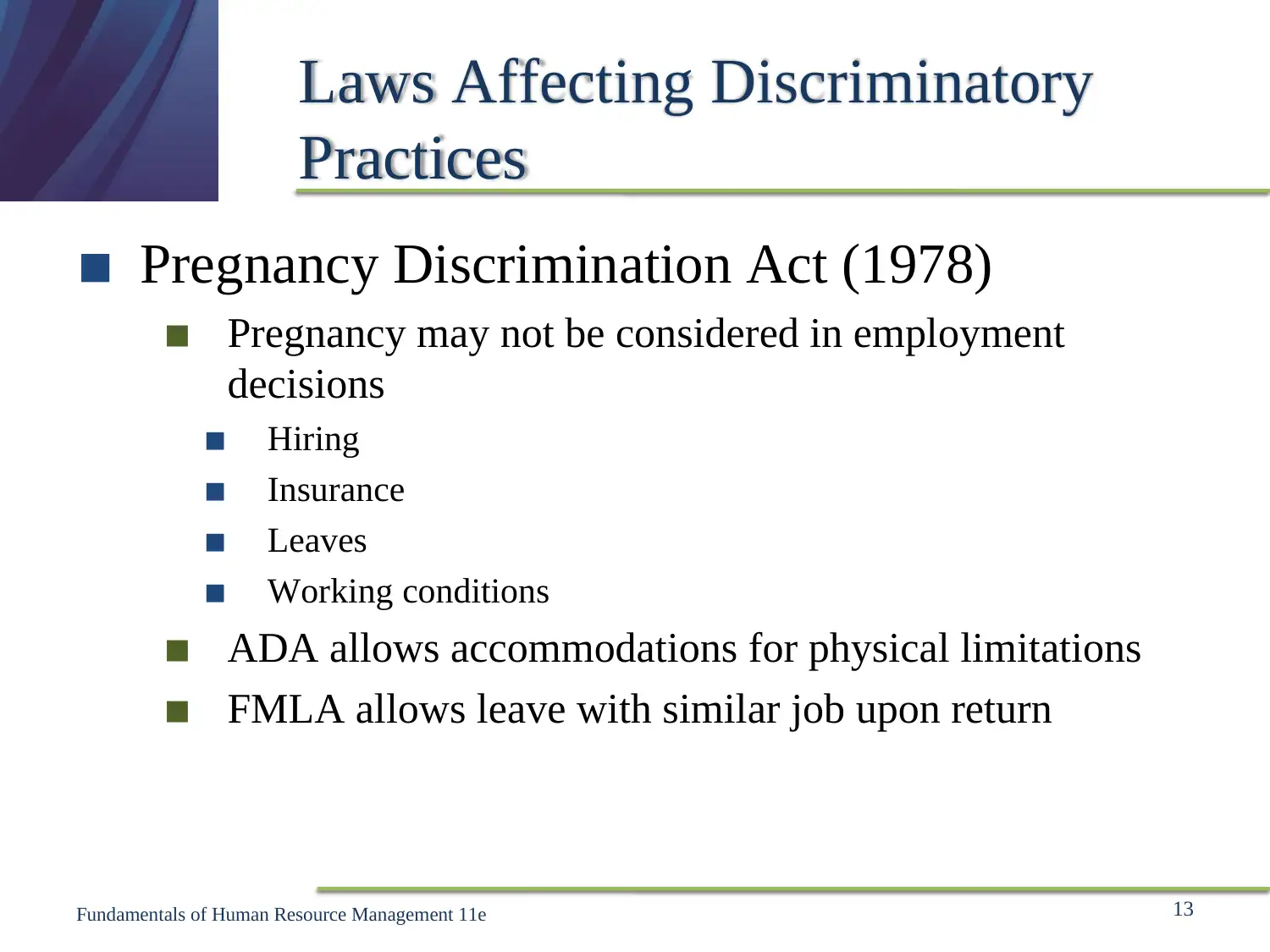
Laws Affecting Discriminatory
Practices
13Fundamentals of Human Resource Management 11e
▪ Pregnancy Discrimination Act (1978)
▪ Pregnancy may not be considered in employment
decisions
▪ Hiring
▪ Insurance
▪ Leaves
▪ Working conditions
▪ ADA allows accommodations for physical limitations
▪ FMLA allows leave with similar job upon return
Practices
13Fundamentals of Human Resource Management 11e
▪ Pregnancy Discrimination Act (1978)
▪ Pregnancy may not be considered in employment
decisions
▪ Hiring
▪ Insurance
▪ Leaves
▪ Working conditions
▪ ADA allows accommodations for physical limitations
▪ FMLA allows leave with similar job upon return
Paraphrase This Document
Need a fresh take? Get an instant paraphrase of this document with our AI Paraphraser
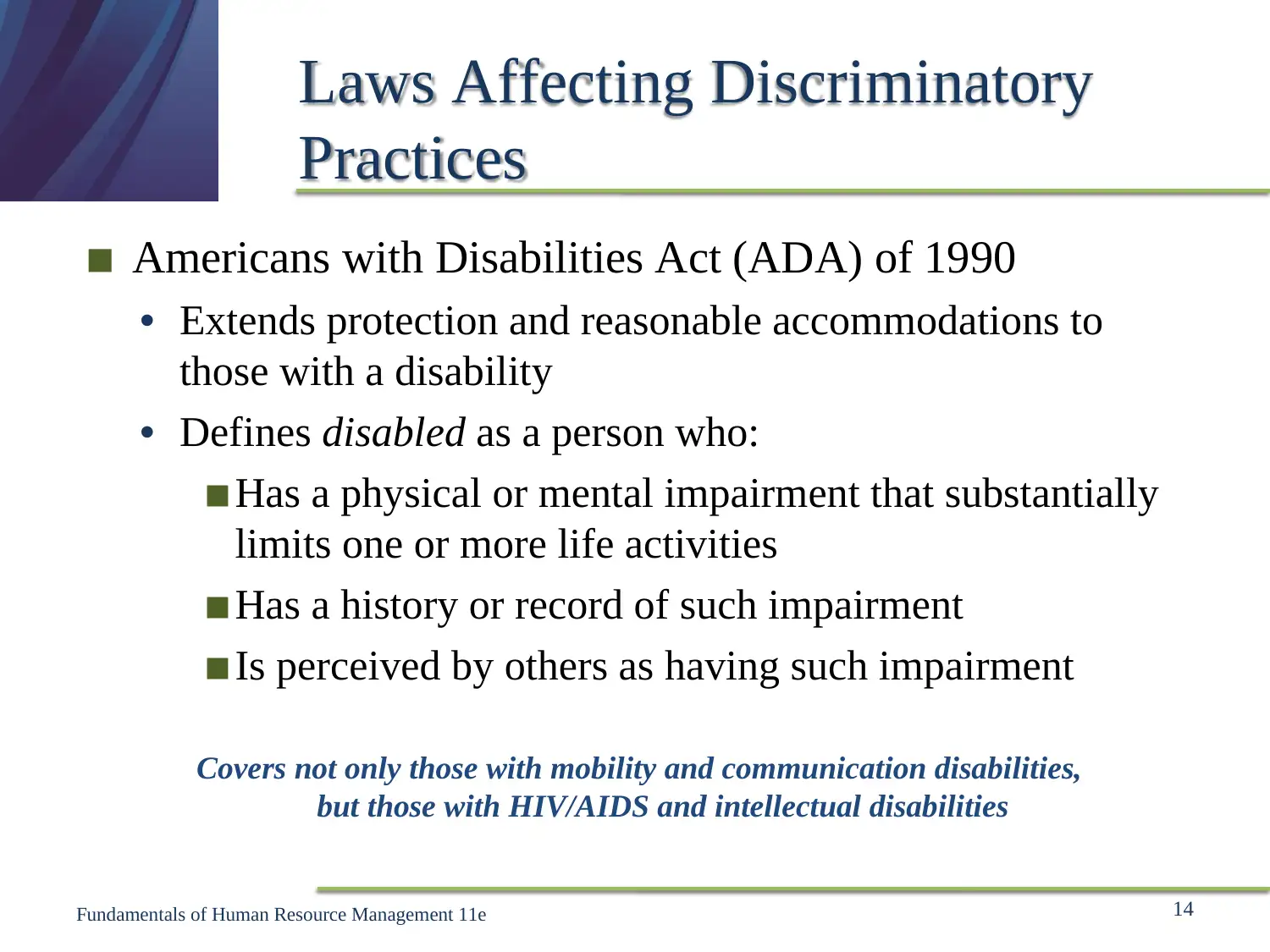
Laws Affecting Discriminatory
Practices
14Fundamentals of Human Resource Management 11e
▪ Americans with Disabilities Act (ADA) of 1990
• Extends protection and reasonable accommodations to
those with a disability
• Defines disabled as a person who:
▪Has a physical or mental impairment that substantially
limits one or more life activities
▪Has a history or record of such impairment
▪Is perceived by others as having such impairment
Covers not only those with mobility and communication disabilities,
but those with HIV/AIDS and intellectual disabilities
Practices
14Fundamentals of Human Resource Management 11e
▪ Americans with Disabilities Act (ADA) of 1990
• Extends protection and reasonable accommodations to
those with a disability
• Defines disabled as a person who:
▪Has a physical or mental impairment that substantially
limits one or more life activities
▪Has a history or record of such impairment
▪Is perceived by others as having such impairment
Covers not only those with mobility and communication disabilities,
but those with HIV/AIDS and intellectual disabilities
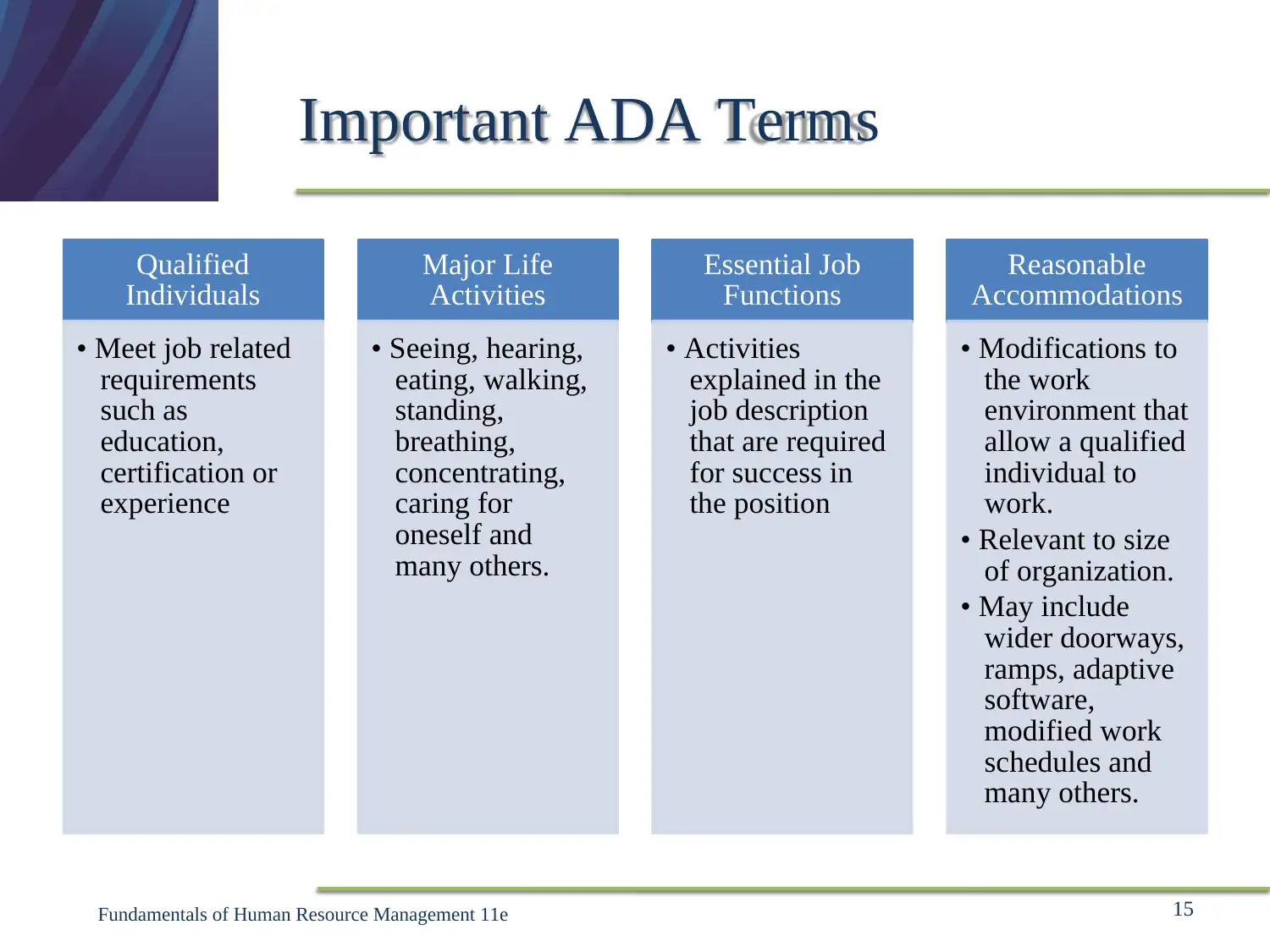
Qualified
Individuals
• Meet job related
requirements
such as
education,
certification or
experience
Major Life
Activities
• Seeing, hearing,
eating, walking,
standing,
breathing,
concentrating,
caring for
oneself and
many others.
Essential Job
Functions
• Activities
explained in the
job description
that are required
for success in
the position
Reasonable
Accommodations
• Modifications to
the work
environment that
allow a qualified
individual to
work.
• Relevant to size
of organization.
• May include
wider doorways,
ramps, adaptive
software,
modified work
schedules and
many others.
Important ADA Terms
15Fundamentals of Human Resource Management 11e
Individuals
• Meet job related
requirements
such as
education,
certification or
experience
Major Life
Activities
• Seeing, hearing,
eating, walking,
standing,
breathing,
concentrating,
caring for
oneself and
many others.
Essential Job
Functions
• Activities
explained in the
job description
that are required
for success in
the position
Reasonable
Accommodations
• Modifications to
the work
environment that
allow a qualified
individual to
work.
• Relevant to size
of organization.
• May include
wider doorways,
ramps, adaptive
software,
modified work
schedules and
many others.
Important ADA Terms
15Fundamentals of Human Resource Management 11e
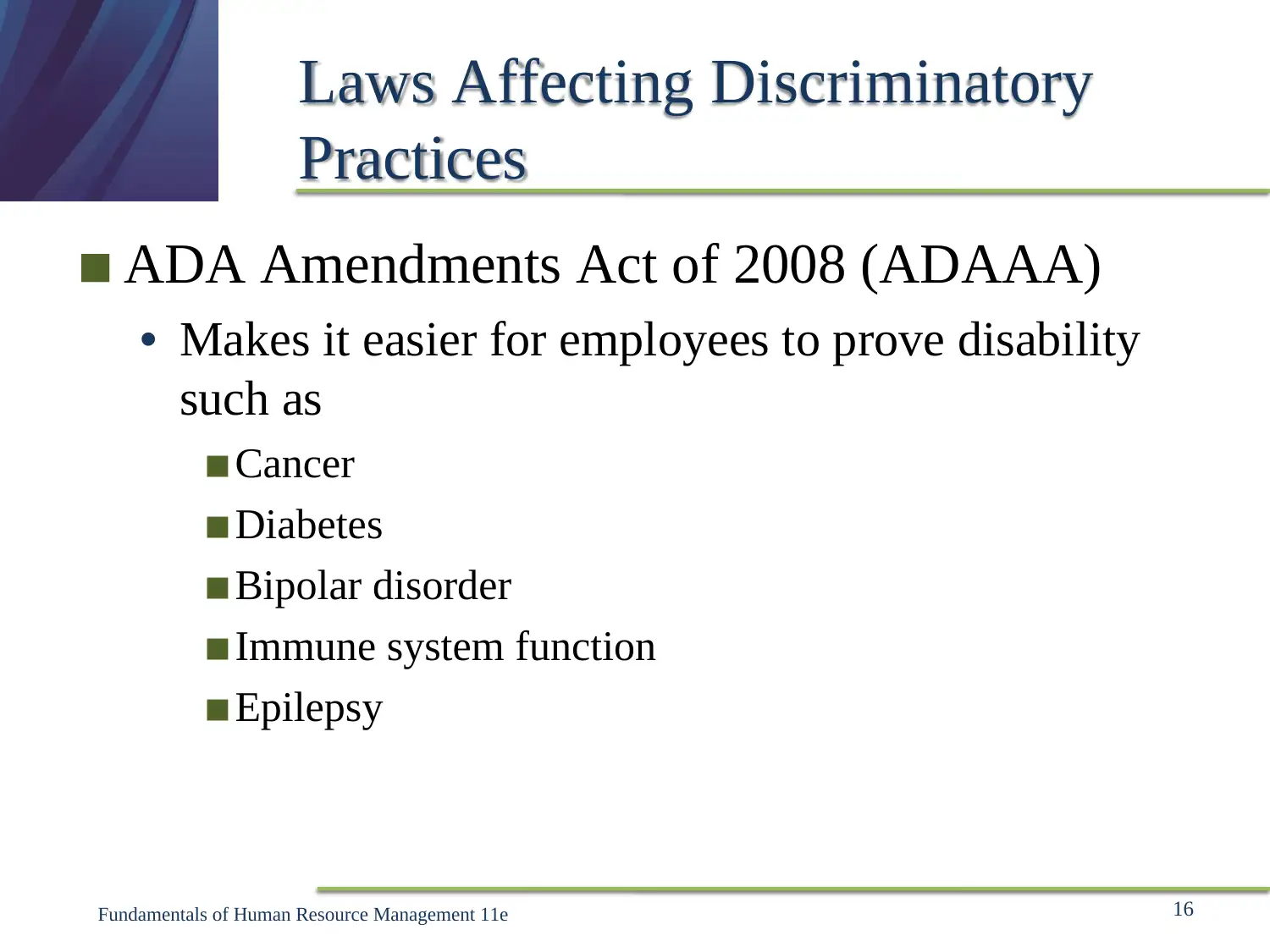
▪ ADA Amendments Act of 2008 (ADAAA)
• Makes it easier for employees to prove disability
such as
▪Cancer
▪Diabetes
▪Bipolar disorder
▪Immune system function
▪Epilepsy
Laws Affecting Discriminatory
Practices
16Fundamentals of Human Resource Management 11e
• Makes it easier for employees to prove disability
such as
▪Cancer
▪Diabetes
▪Bipolar disorder
▪Immune system function
▪Epilepsy
Laws Affecting Discriminatory
Practices
16Fundamentals of Human Resource Management 11e
Secure Best Marks with AI Grader
Need help grading? Try our AI Grader for instant feedback on your assignments.
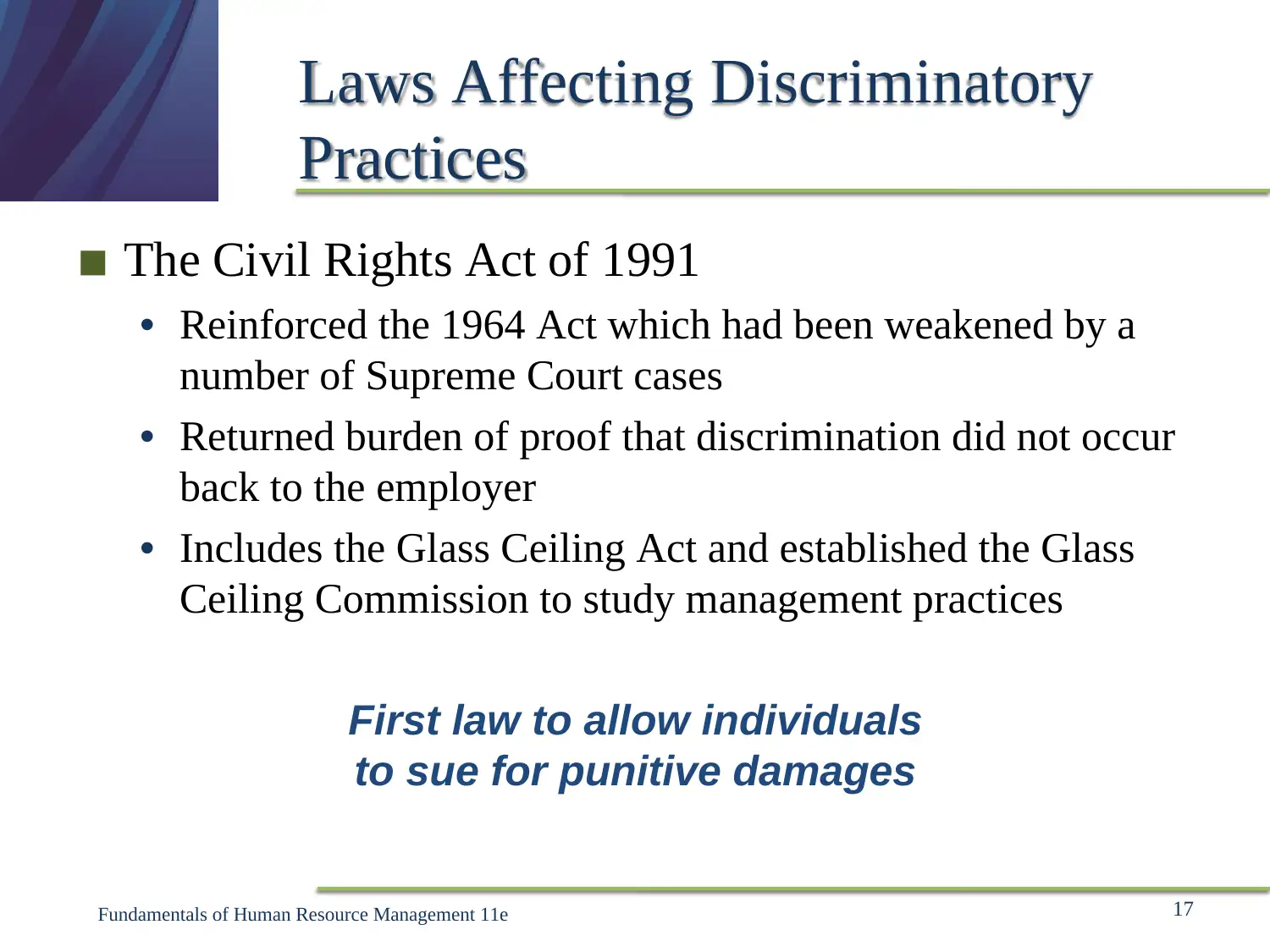
▪ The Civil Rights Act of 1991
• Reinforced the 1964 Act which had been weakened by a
number of Supreme Court cases
• Returned burden of proof that discrimination did not occur
back to the employer
• Includes the Glass Ceiling Act and established the Glass
Ceiling Commission to study management practices
Laws Affecting Discriminatory
Practices
17Fundamentals of Human Resource Management 11e
First law to allow individuals
to sue for punitive damages
• Reinforced the 1964 Act which had been weakened by a
number of Supreme Court cases
• Returned burden of proof that discrimination did not occur
back to the employer
• Includes the Glass Ceiling Act and established the Glass
Ceiling Commission to study management practices
Laws Affecting Discriminatory
Practices
17Fundamentals of Human Resource Management 11e
First law to allow individuals
to sue for punitive damages
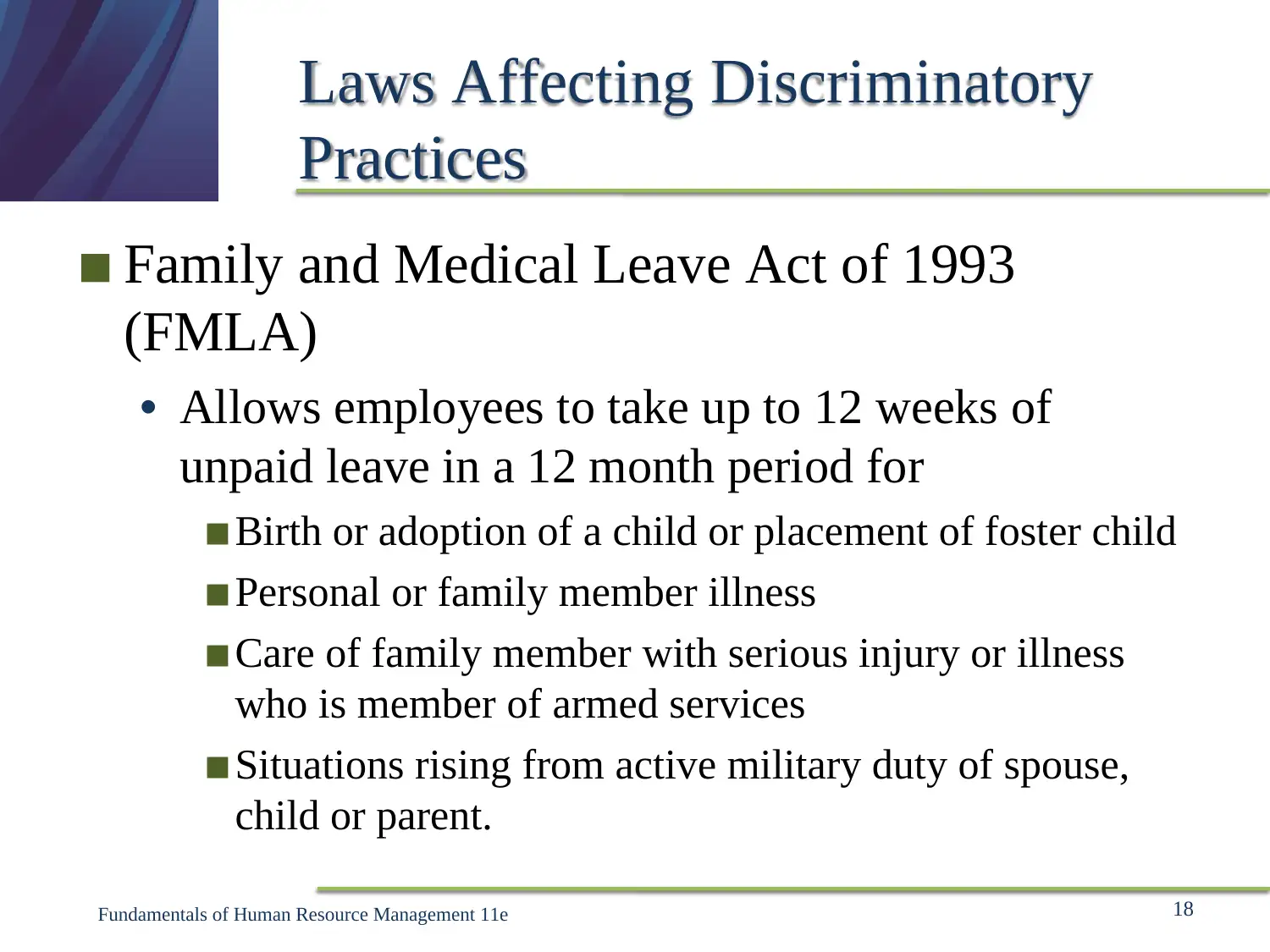
▪ Family and Medical Leave Act of 1993
(FMLA)
• Allows employees to take up to 12 weeks of
unpaid leave in a 12 month period for
▪Birth or adoption of a child or placement of foster child
▪Personal or family member illness
▪Care of family member with serious injury or illness
who is member of armed services
▪Situations rising from active military duty of spouse,
child or parent.
Laws Affecting Discriminatory
Practices
18Fundamentals of Human Resource Management 11e
(FMLA)
• Allows employees to take up to 12 weeks of
unpaid leave in a 12 month period for
▪Birth or adoption of a child or placement of foster child
▪Personal or family member illness
▪Care of family member with serious injury or illness
who is member of armed services
▪Situations rising from active military duty of spouse,
child or parent.
Laws Affecting Discriminatory
Practices
18Fundamentals of Human Resource Management 11e
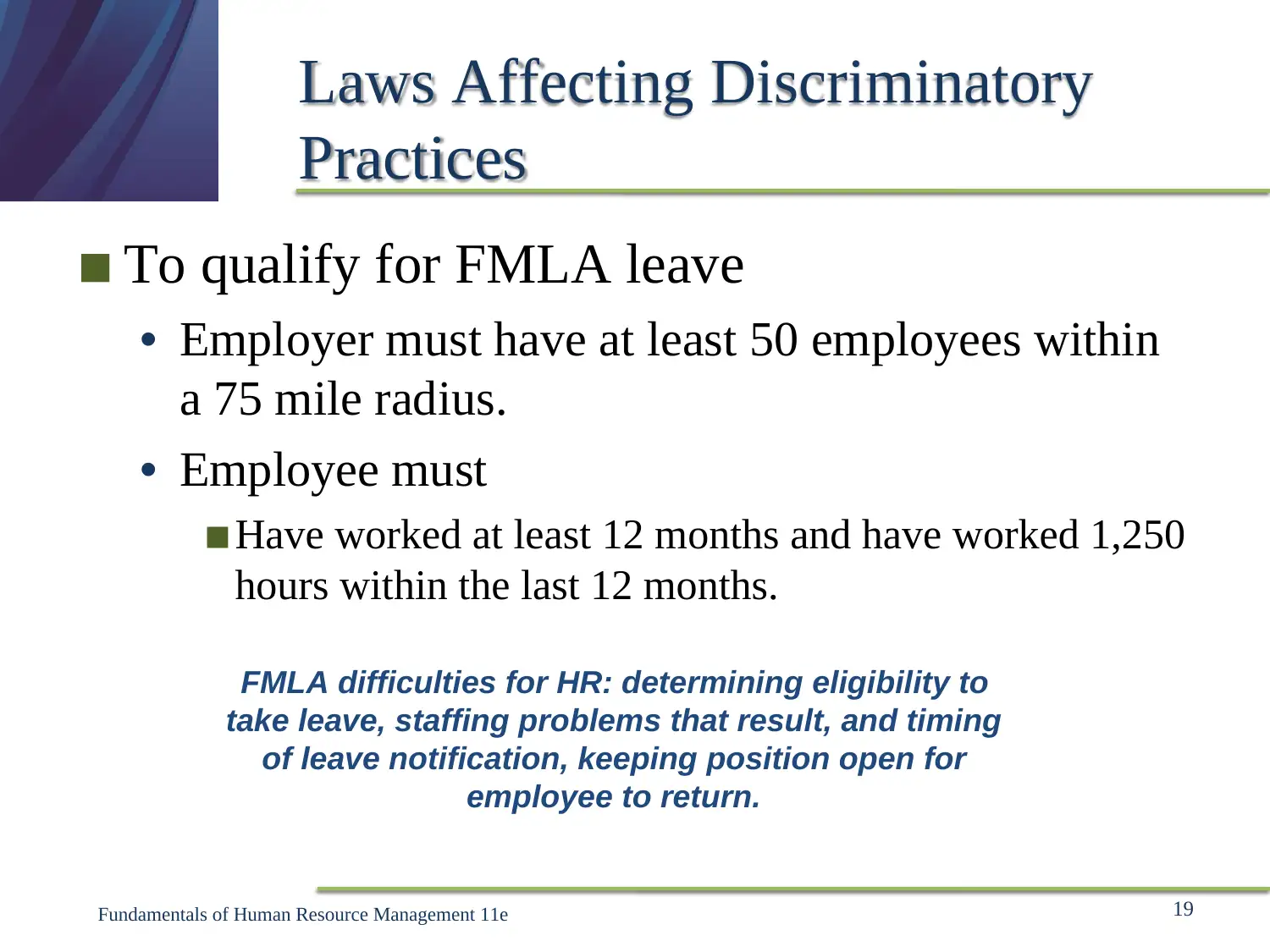
▪ To qualify for FMLA leave
• Employer must have at least 50 employees within
a 75 mile radius.
• Employee must
▪Have worked at least 12 months and have worked 1,250
hours within the last 12 months.
Laws Affecting Discriminatory
Practices
19Fundamentals of Human Resource Management 11e
FMLA difficulties for HR: determining eligibility to
take leave, staffing problems that result, and timing
of leave notification, keeping position open for
employee to return.
• Employer must have at least 50 employees within
a 75 mile radius.
• Employee must
▪Have worked at least 12 months and have worked 1,250
hours within the last 12 months.
Laws Affecting Discriminatory
Practices
19Fundamentals of Human Resource Management 11e
FMLA difficulties for HR: determining eligibility to
take leave, staffing problems that result, and timing
of leave notification, keeping position open for
employee to return.
Paraphrase This Document
Need a fresh take? Get an instant paraphrase of this document with our AI Paraphraser
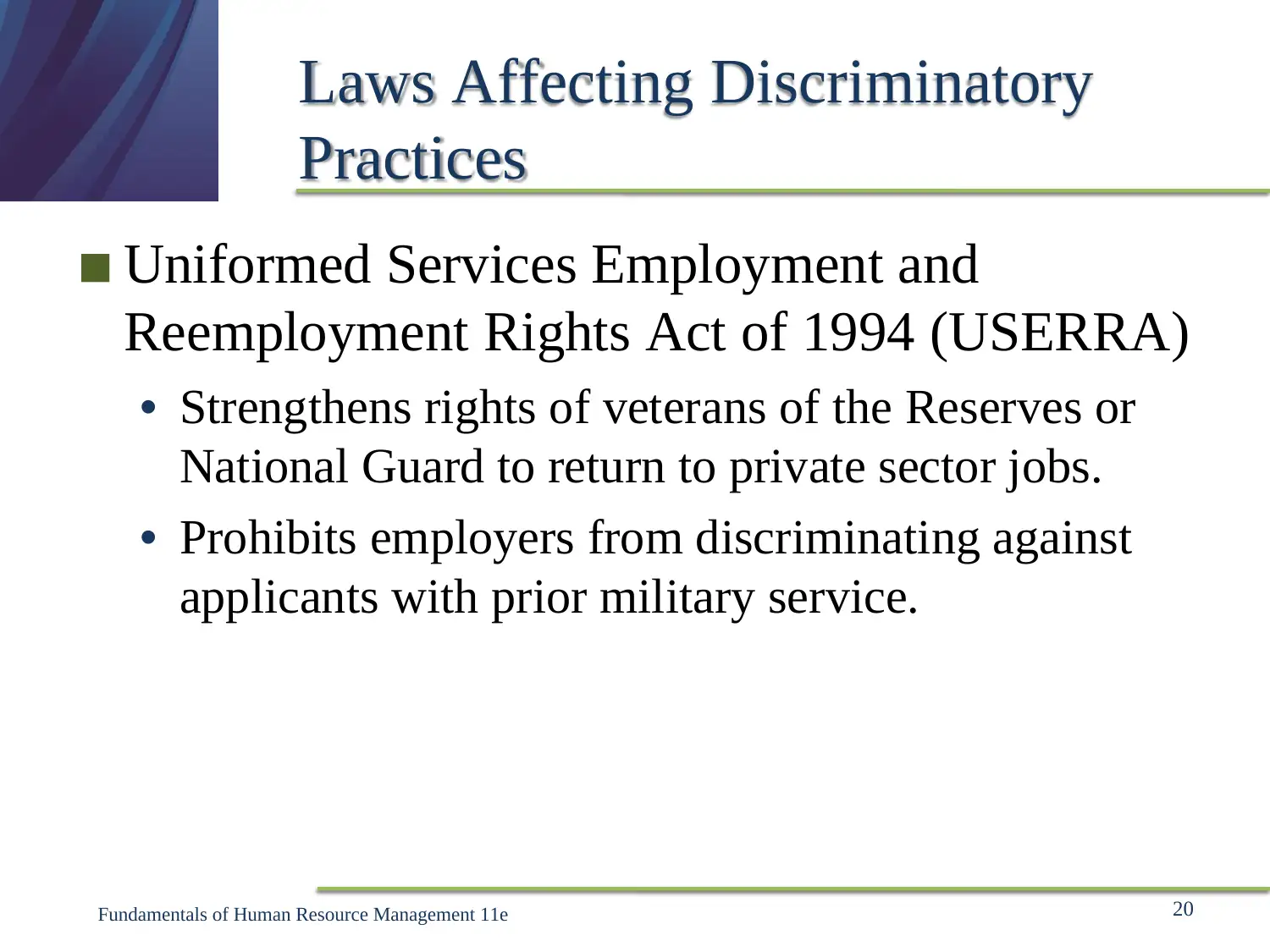
▪ Uniformed Services Employment and
Reemployment Rights Act of 1994 (USERRA)
• Strengthens rights of veterans of the Reserves or
National Guard to return to private sector jobs.
• Prohibits employers from discriminating against
applicants with prior military service.
Laws Affecting Discriminatory
Practices
20Fundamentals of Human Resource Management 11e
Reemployment Rights Act of 1994 (USERRA)
• Strengthens rights of veterans of the Reserves or
National Guard to return to private sector jobs.
• Prohibits employers from discriminating against
applicants with prior military service.
Laws Affecting Discriminatory
Practices
20Fundamentals of Human Resource Management 11e
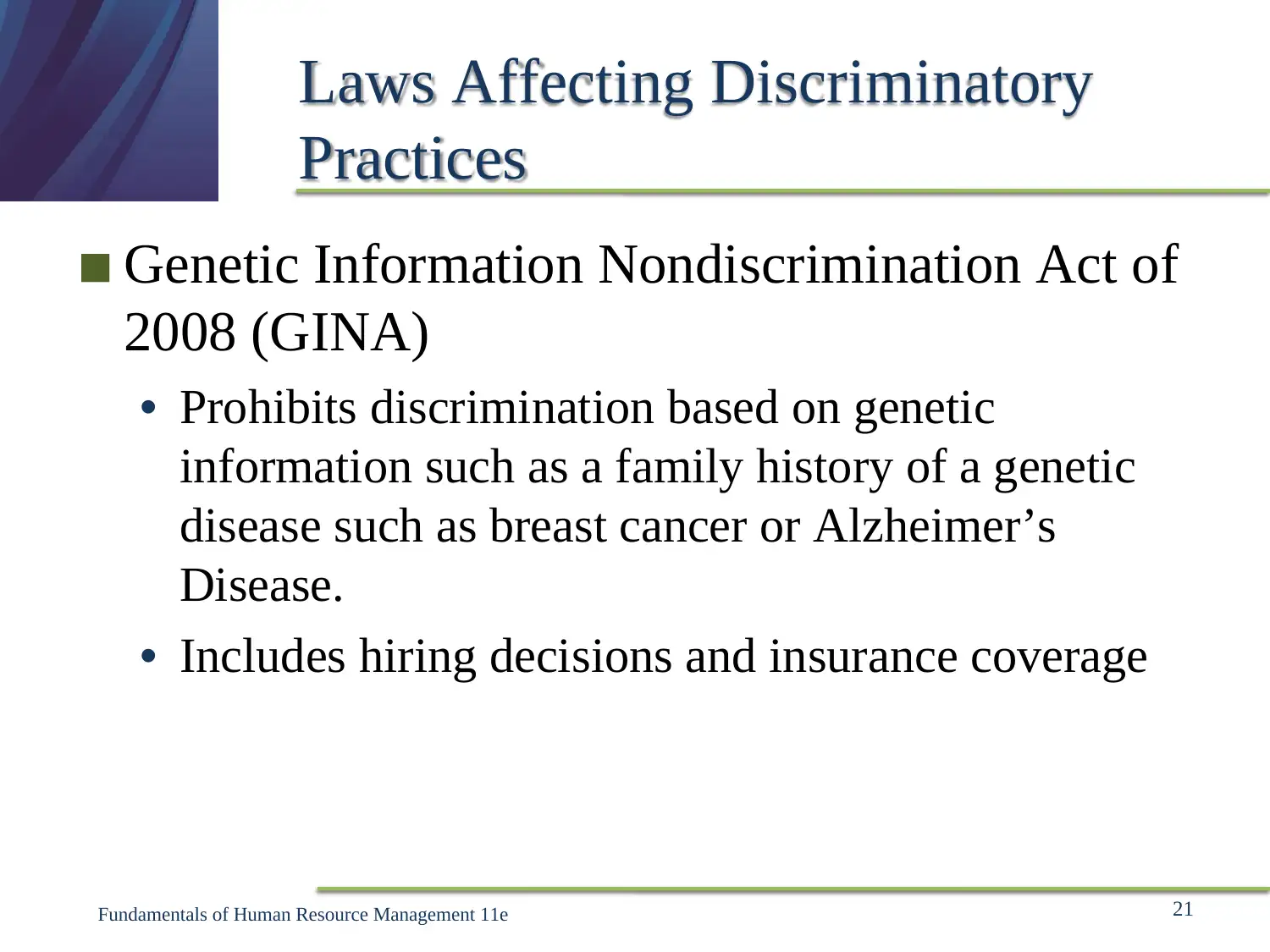
▪ Genetic Information Nondiscrimination Act of
2008 (GINA)
• Prohibits discrimination based on genetic
information such as a family history of a genetic
disease such as breast cancer or Alzheimer’s
Disease.
• Includes hiring decisions and insurance coverage
Laws Affecting Discriminatory
Practices
21Fundamentals of Human Resource Management 11e
2008 (GINA)
• Prohibits discrimination based on genetic
information such as a family history of a genetic
disease such as breast cancer or Alzheimer’s
Disease.
• Includes hiring decisions and insurance coverage
Laws Affecting Discriminatory
Practices
21Fundamentals of Human Resource Management 11e
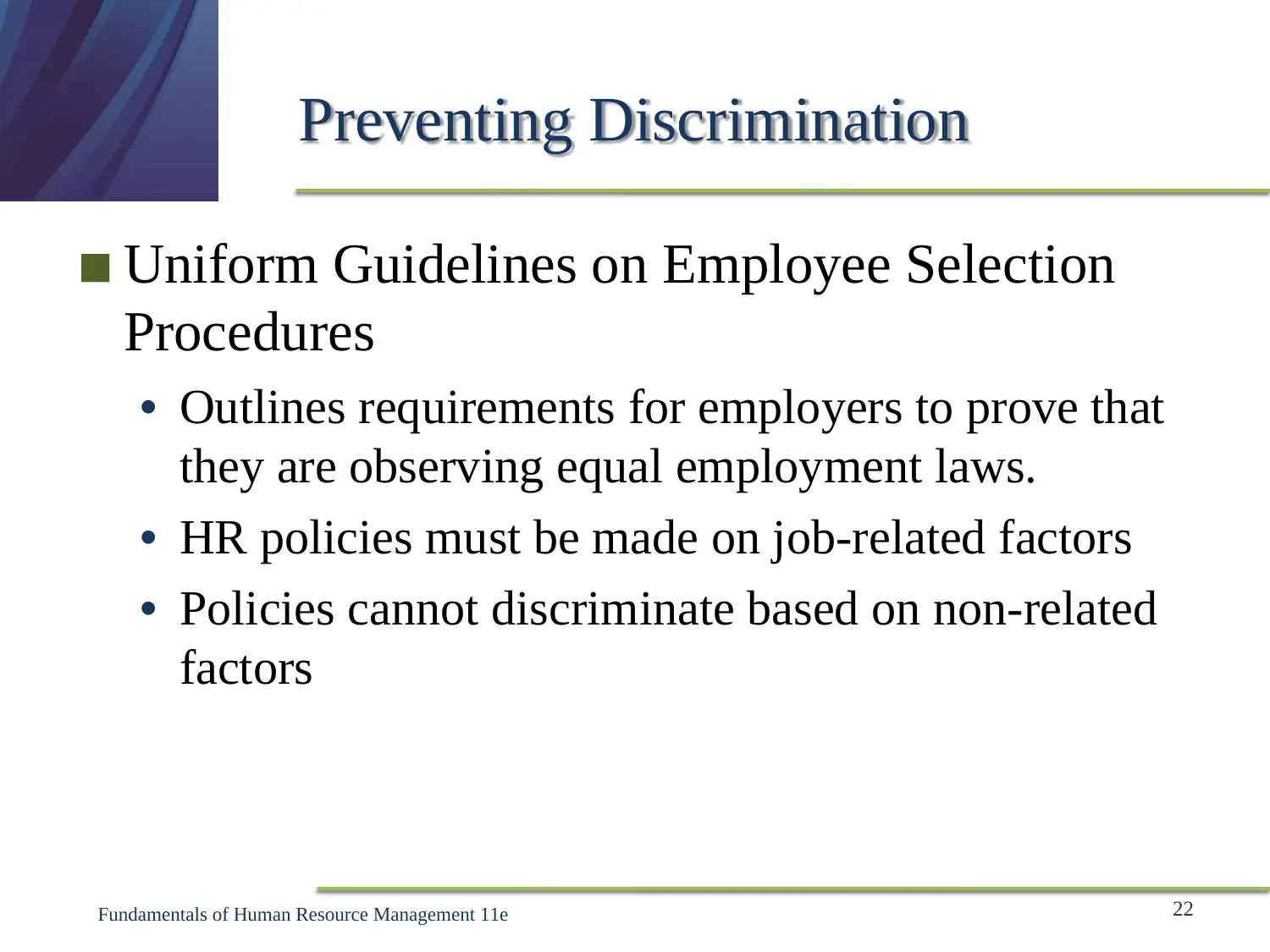
▪ Uniform Guidelines on Employee Selection
Procedures
• Outlines requirements for employers to prove that
they are observing equal employment laws.
• HR policies must be made on job-related factors
• Policies cannot discriminate based on non-related
factors
Preventing Discrimination
22Fundamentals of Human Resource Management 11e
Procedures
• Outlines requirements for employers to prove that
they are observing equal employment laws.
• HR policies must be made on job-related factors
• Policies cannot discriminate based on non-related
factors
Preventing Discrimination
22Fundamentals of Human Resource Management 11e
Secure Best Marks with AI Grader
Need help grading? Try our AI Grader for instant feedback on your assignments.
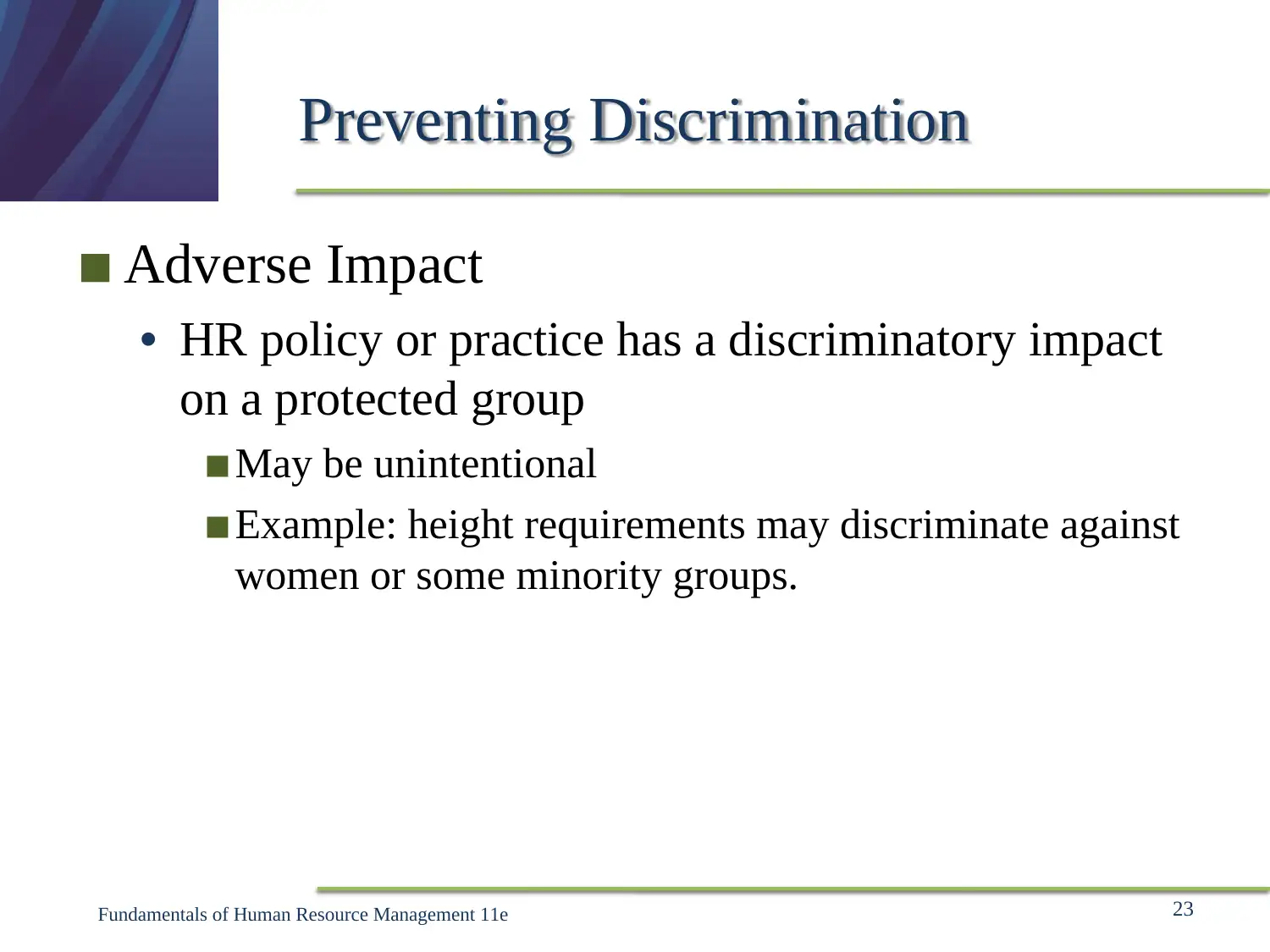
▪ Adverse Impact
• HR policy or practice has a discriminatory impact
on a protected group
▪May be unintentional
▪Example: height requirements may discriminate against
women or some minority groups.
Preventing Discrimination
23Fundamentals of Human Resource Management 11e
• HR policy or practice has a discriminatory impact
on a protected group
▪May be unintentional
▪Example: height requirements may discriminate against
women or some minority groups.
Preventing Discrimination
23Fundamentals of Human Resource Management 11e
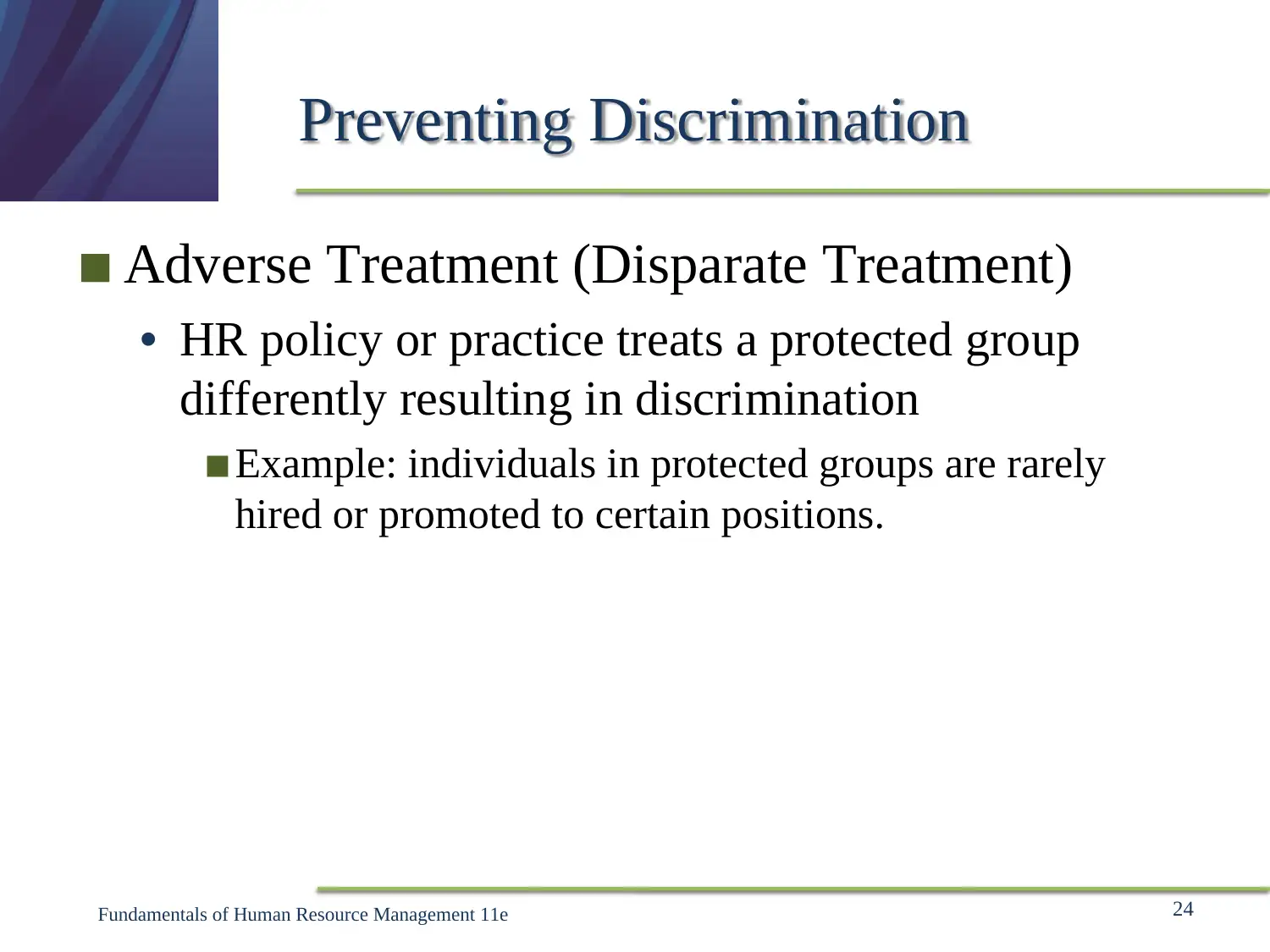
▪ Adverse Treatment (Disparate Treatment)
• HR policy or practice treats a protected group
differently resulting in discrimination
▪Example: individuals in protected groups are rarely
hired or promoted to certain positions.
Preventing Discrimination
24Fundamentals of Human Resource Management 11e
• HR policy or practice treats a protected group
differently resulting in discrimination
▪Example: individuals in protected groups are rarely
hired or promoted to certain positions.
Preventing Discrimination
24Fundamentals of Human Resource Management 11e
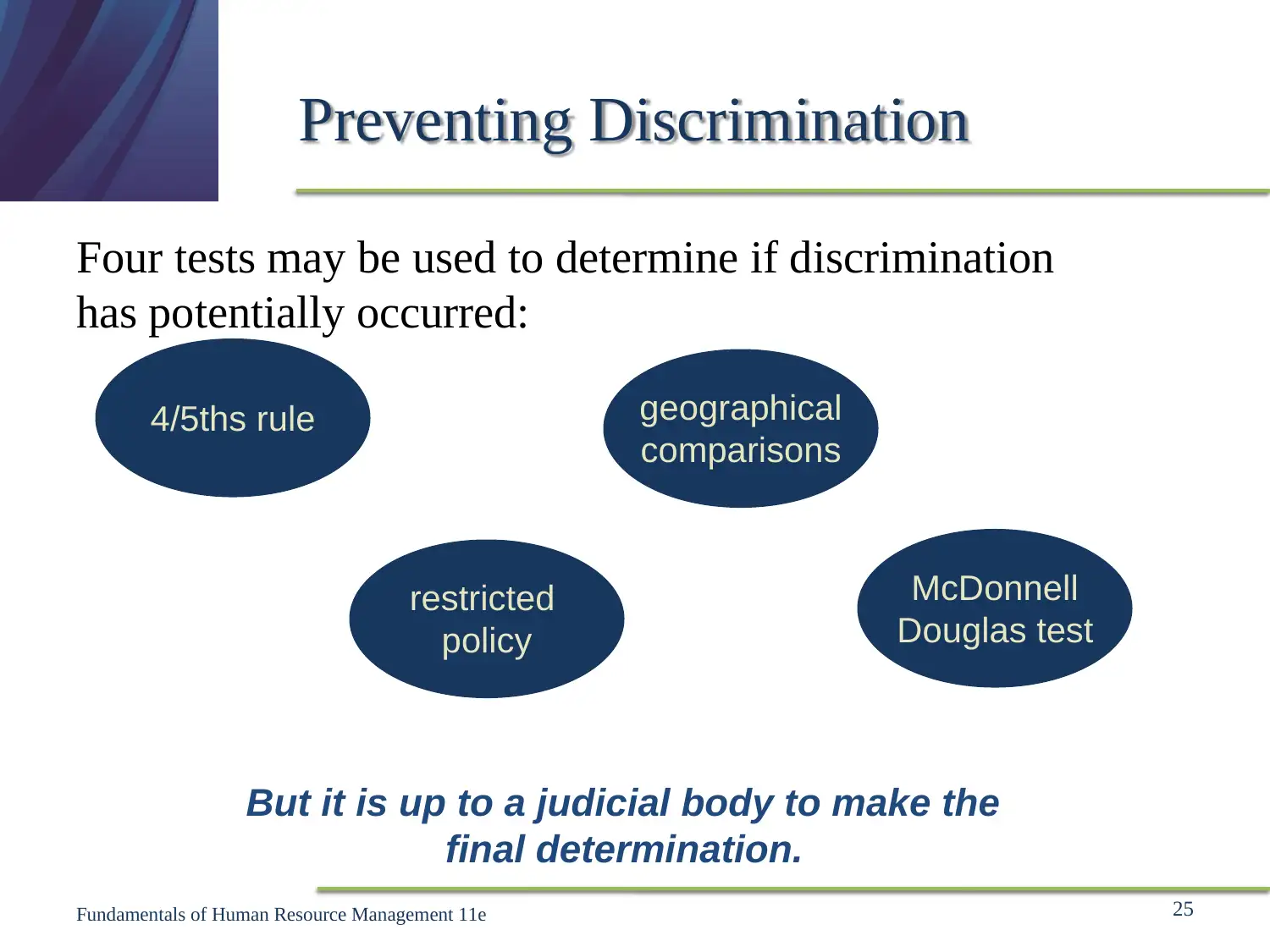
Four tests may be used to determine if discrimination
has potentially occurred:
Preventing Discrimination
25Fundamentals of Human Resource Management 11e
But it is up to a judicial body to make the
final determination.
McDonnell
Douglas test
geographical
comparisons
4/5ths rule
restricted
policy
has potentially occurred:
Preventing Discrimination
25Fundamentals of Human Resource Management 11e
But it is up to a judicial body to make the
final determination.
McDonnell
Douglas test
geographical
comparisons
4/5ths rule
restricted
policy
Paraphrase This Document
Need a fresh take? Get an instant paraphrase of this document with our AI Paraphraser
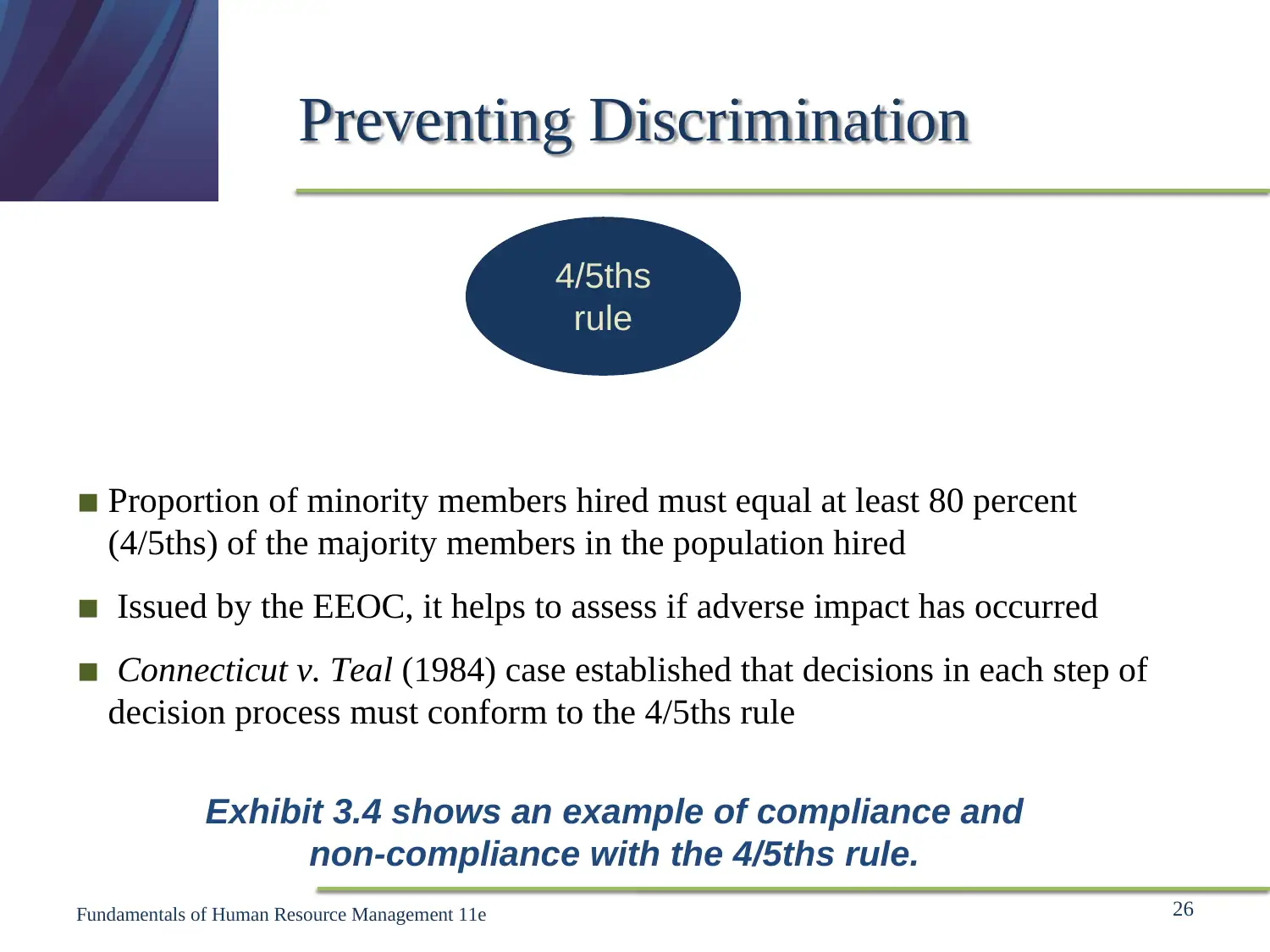
▪ Proportion of minority members hired must equal at least 80 percent
(4/5ths) of the majority members in the population hired
▪ Issued by the EEOC, it helps to assess if adverse impact has occurred
▪ Connecticut v. Teal (1984) case established that decisions in each step of
decision process must conform to the 4/5ths rule
Preventing Discrimination
26Fundamentals of Human Resource Management 11e
4/5ths
rule
Exhibit 3.4 shows an example of compliance and
non-compliance with the 4/5ths rule.
(4/5ths) of the majority members in the population hired
▪ Issued by the EEOC, it helps to assess if adverse impact has occurred
▪ Connecticut v. Teal (1984) case established that decisions in each step of
decision process must conform to the 4/5ths rule
Preventing Discrimination
26Fundamentals of Human Resource Management 11e
4/5ths
rule
Exhibit 3.4 shows an example of compliance and
non-compliance with the 4/5ths rule.
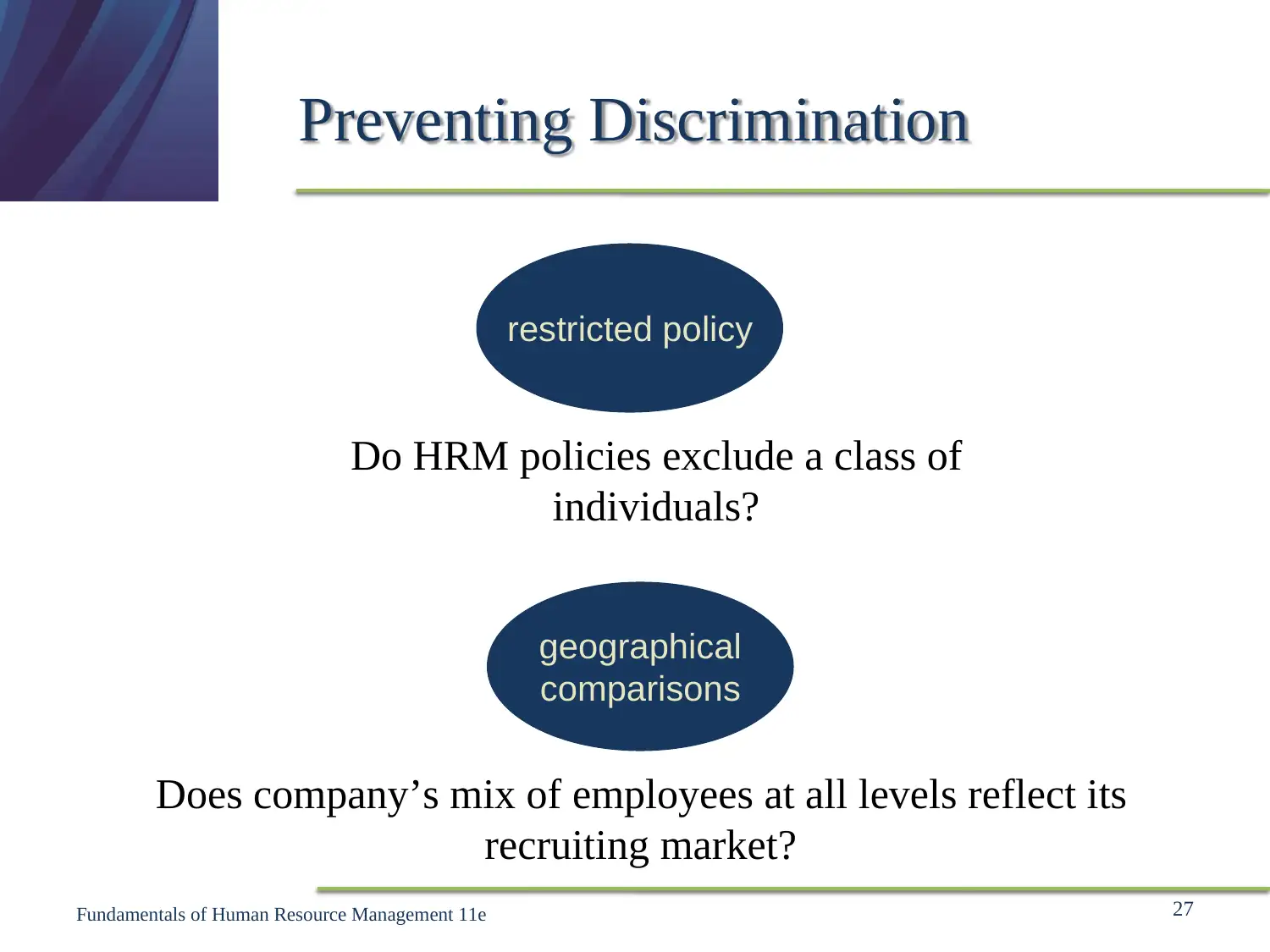
Preventing Discrimination
27Fundamentals of Human Resource Management 11e
Does company’s mix of employees at all levels reflect its
recruiting market?
restricted policy
geographical
comparisons
Do HRM policies exclude a class of
individuals?
27Fundamentals of Human Resource Management 11e
Does company’s mix of employees at all levels reflect its
recruiting market?
restricted policy
geographical
comparisons
Do HRM policies exclude a class of
individuals?
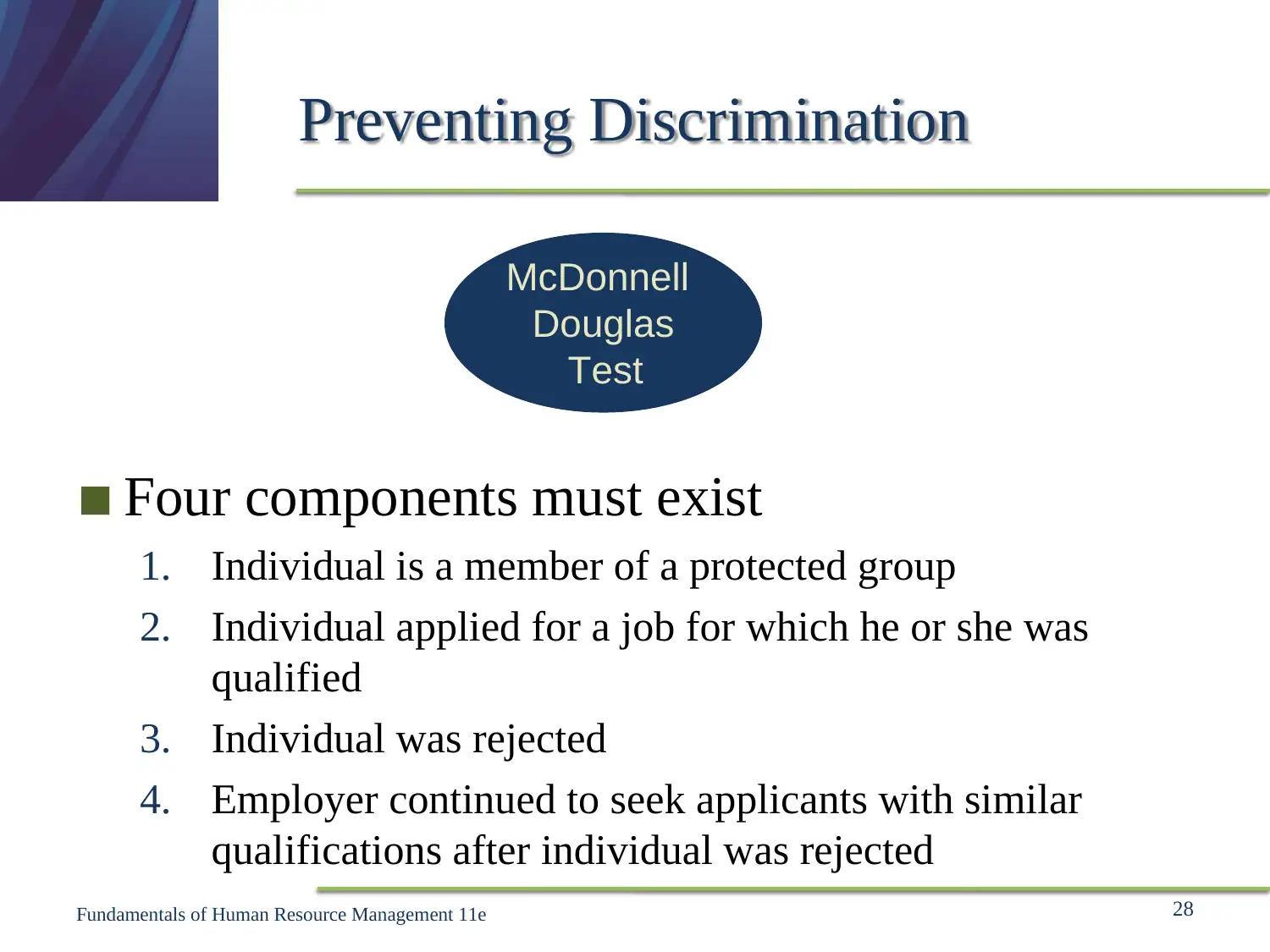
Preventing Discrimination
28Fundamentals of Human Resource Management 11e
McDonnell
Douglas
Test
▪ Four components must exist
1. Individual is a member of a protected group
2. Individual applied for a job for which he or she was
qualified
3. Individual was rejected
4. Employer continued to seek applicants with similar
qualifications after individual was rejected
28Fundamentals of Human Resource Management 11e
McDonnell
Douglas
Test
▪ Four components must exist
1. Individual is a member of a protected group
2. Individual applied for a job for which he or she was
qualified
3. Individual was rejected
4. Employer continued to seek applicants with similar
qualifications after individual was rejected
Secure Best Marks with AI Grader
Need help grading? Try our AI Grader for instant feedback on your assignments.
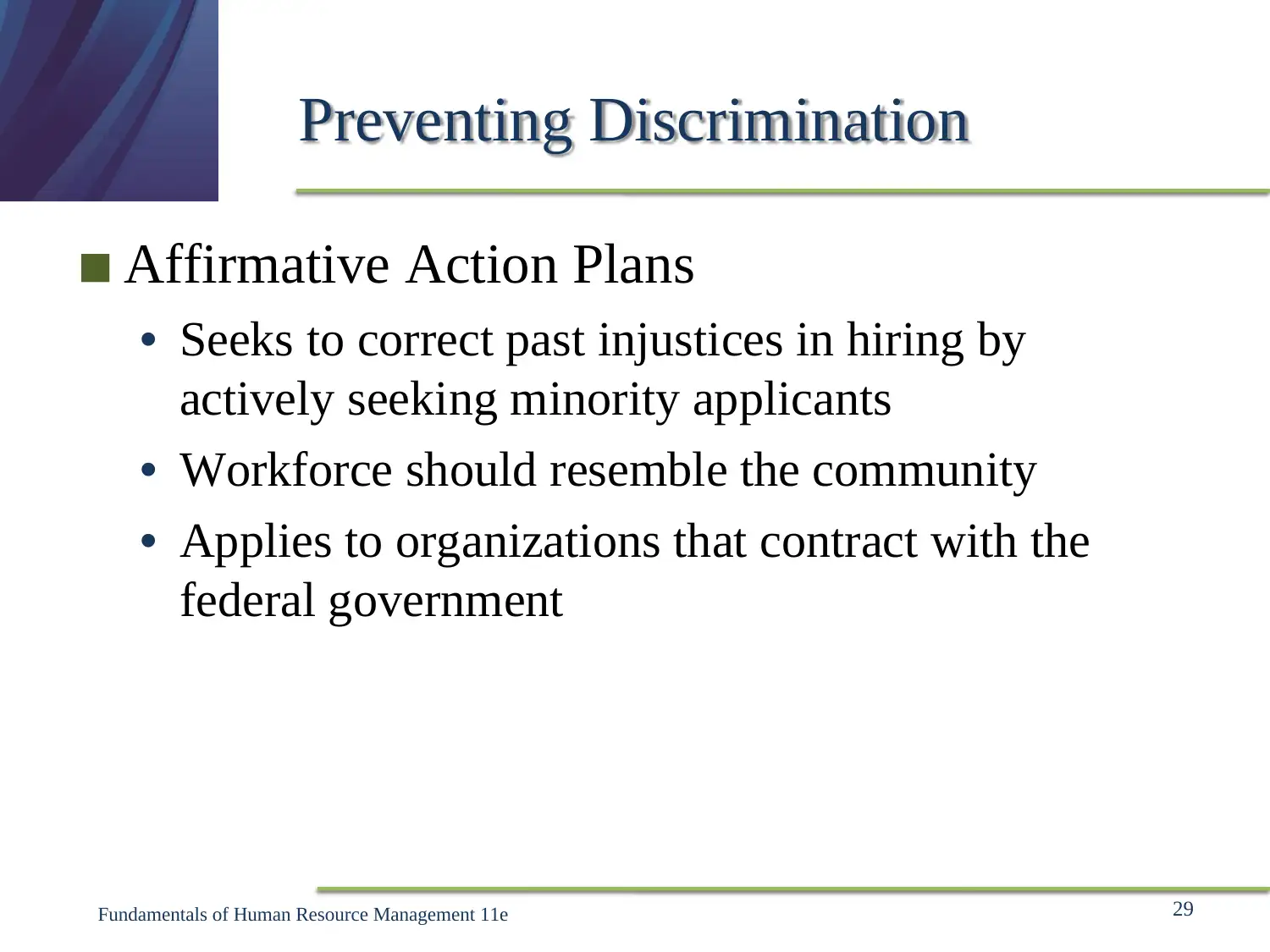
▪ Affirmative Action Plans
• Seeks to correct past injustices in hiring by
actively seeking minority applicants
• Workforce should resemble the community
• Applies to organizations that contract with the
federal government
Preventing Discrimination
29Fundamentals of Human Resource Management 11e
• Seeks to correct past injustices in hiring by
actively seeking minority applicants
• Workforce should resemble the community
• Applies to organizations that contract with the
federal government
Preventing Discrimination
29Fundamentals of Human Resource Management 11e
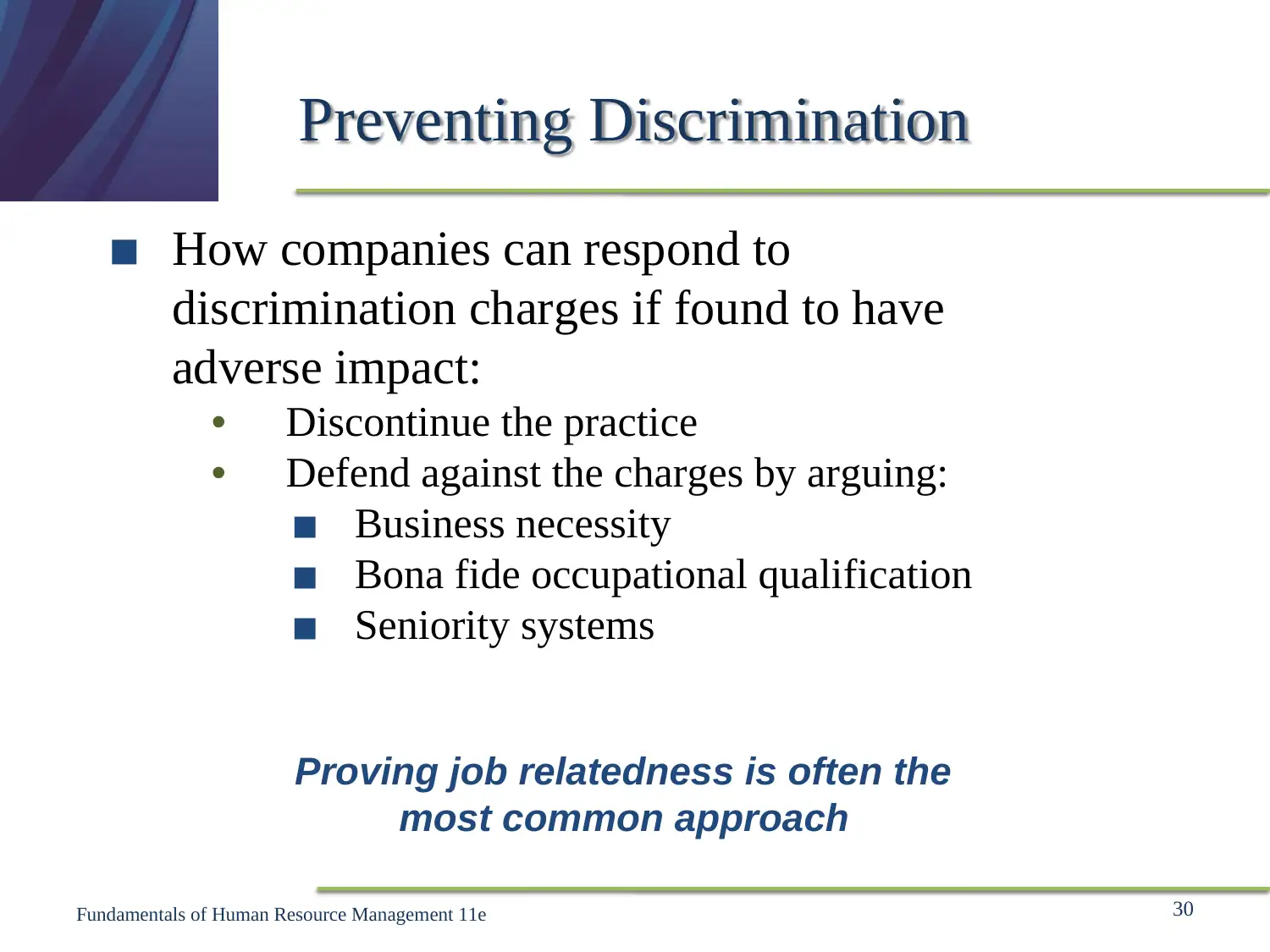
Preventing Discrimination
30Fundamentals of Human Resource Management 11e
▪ How companies can respond to
discrimination charges if found to have
adverse impact:
• Discontinue the practice
• Defend against the charges by arguing:
▪ Business necessity
▪ Bona fide occupational qualification
▪ Seniority systems
Proving job relatedness is often the
most common approach
30Fundamentals of Human Resource Management 11e
▪ How companies can respond to
discrimination charges if found to have
adverse impact:
• Discontinue the practice
• Defend against the charges by arguing:
▪ Business necessity
▪ Bona fide occupational qualification
▪ Seniority systems
Proving job relatedness is often the
most common approach
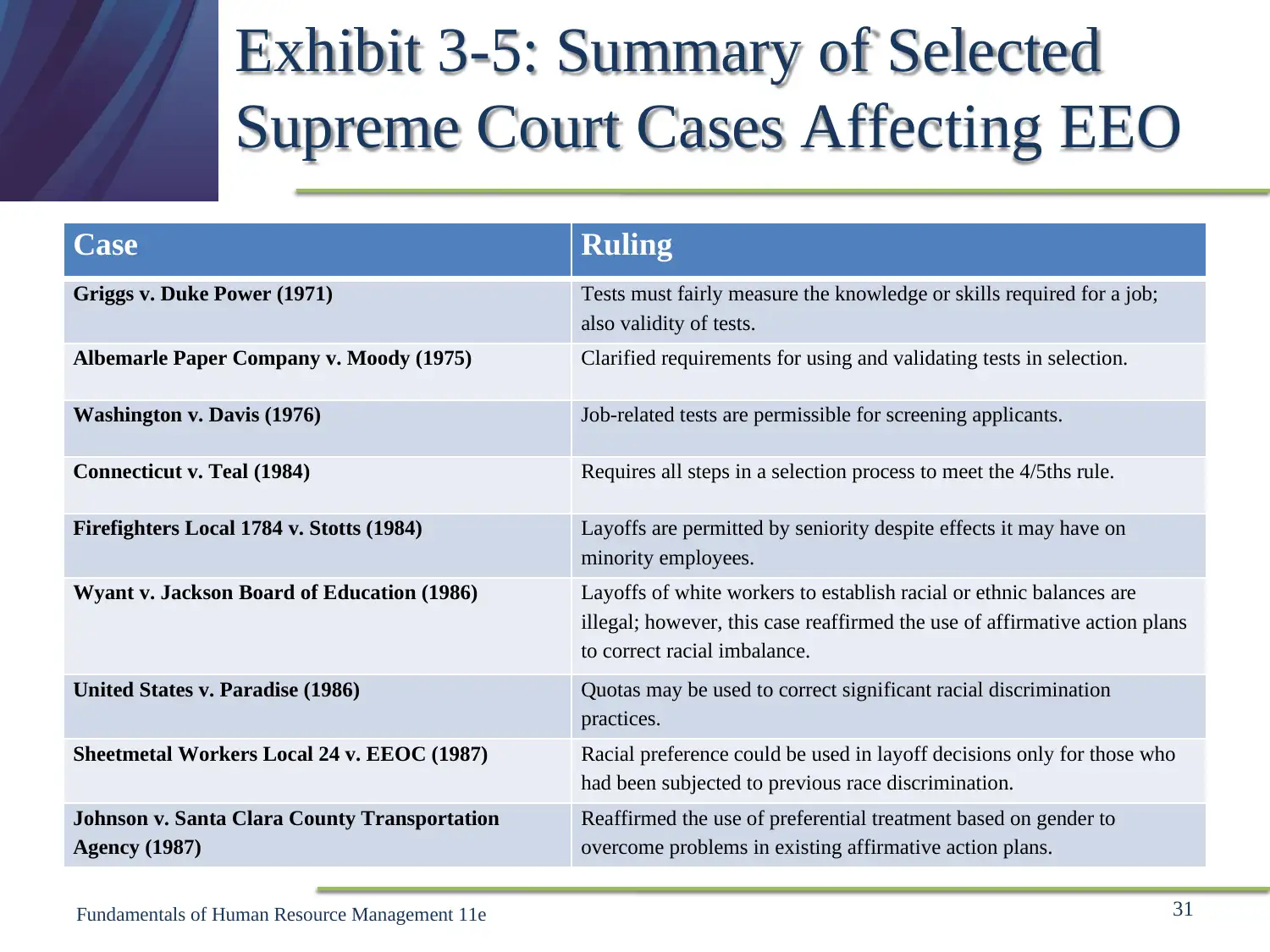
Exhibit 3-5: Summary of Selected
Supreme Court Cases Affecting EEO
31Fundamentals of Human Resource Management 11e
Case Ruling
Griggs v. Duke Power (1971) Tests must fairly measure the knowledge or skills required for a job;
also validity of tests.
Albemarle Paper Company v. Moody (1975) Clarified requirements for using and validating tests in selection.
Washington v. Davis (1976) Job-related tests are permissible for screening applicants.
Connecticut v. Teal (1984) Requires all steps in a selection process to meet the 4/5ths rule.
Firefighters Local 1784 v. Stotts (1984) Layoffs are permitted by seniority despite effects it may have on
minority employees.
Wyant v. Jackson Board of Education (1986) Layoffs of white workers to establish racial or ethnic balances are
illegal; however, this case reaffirmed the use of affirmative action plans
to correct racial imbalance.
United States v. Paradise (1986) Quotas may be used to correct significant racial discrimination
practices.
Sheetmetal Workers Local 24 v. EEOC (1987) Racial preference could be used in layoff decisions only for those who
had been subjected to previous race discrimination.
Johnson v. Santa Clara County Transportation
Agency (1987)
Reaffirmed the use of preferential treatment based on gender to
overcome problems in existing affirmative action plans.
Supreme Court Cases Affecting EEO
31Fundamentals of Human Resource Management 11e
Case Ruling
Griggs v. Duke Power (1971) Tests must fairly measure the knowledge or skills required for a job;
also validity of tests.
Albemarle Paper Company v. Moody (1975) Clarified requirements for using and validating tests in selection.
Washington v. Davis (1976) Job-related tests are permissible for screening applicants.
Connecticut v. Teal (1984) Requires all steps in a selection process to meet the 4/5ths rule.
Firefighters Local 1784 v. Stotts (1984) Layoffs are permitted by seniority despite effects it may have on
minority employees.
Wyant v. Jackson Board of Education (1986) Layoffs of white workers to establish racial or ethnic balances are
illegal; however, this case reaffirmed the use of affirmative action plans
to correct racial imbalance.
United States v. Paradise (1986) Quotas may be used to correct significant racial discrimination
practices.
Sheetmetal Workers Local 24 v. EEOC (1987) Racial preference could be used in layoff decisions only for those who
had been subjected to previous race discrimination.
Johnson v. Santa Clara County Transportation
Agency (1987)
Reaffirmed the use of preferential treatment based on gender to
overcome problems in existing affirmative action plans.
Paraphrase This Document
Need a fresh take? Get an instant paraphrase of this document with our AI Paraphraser
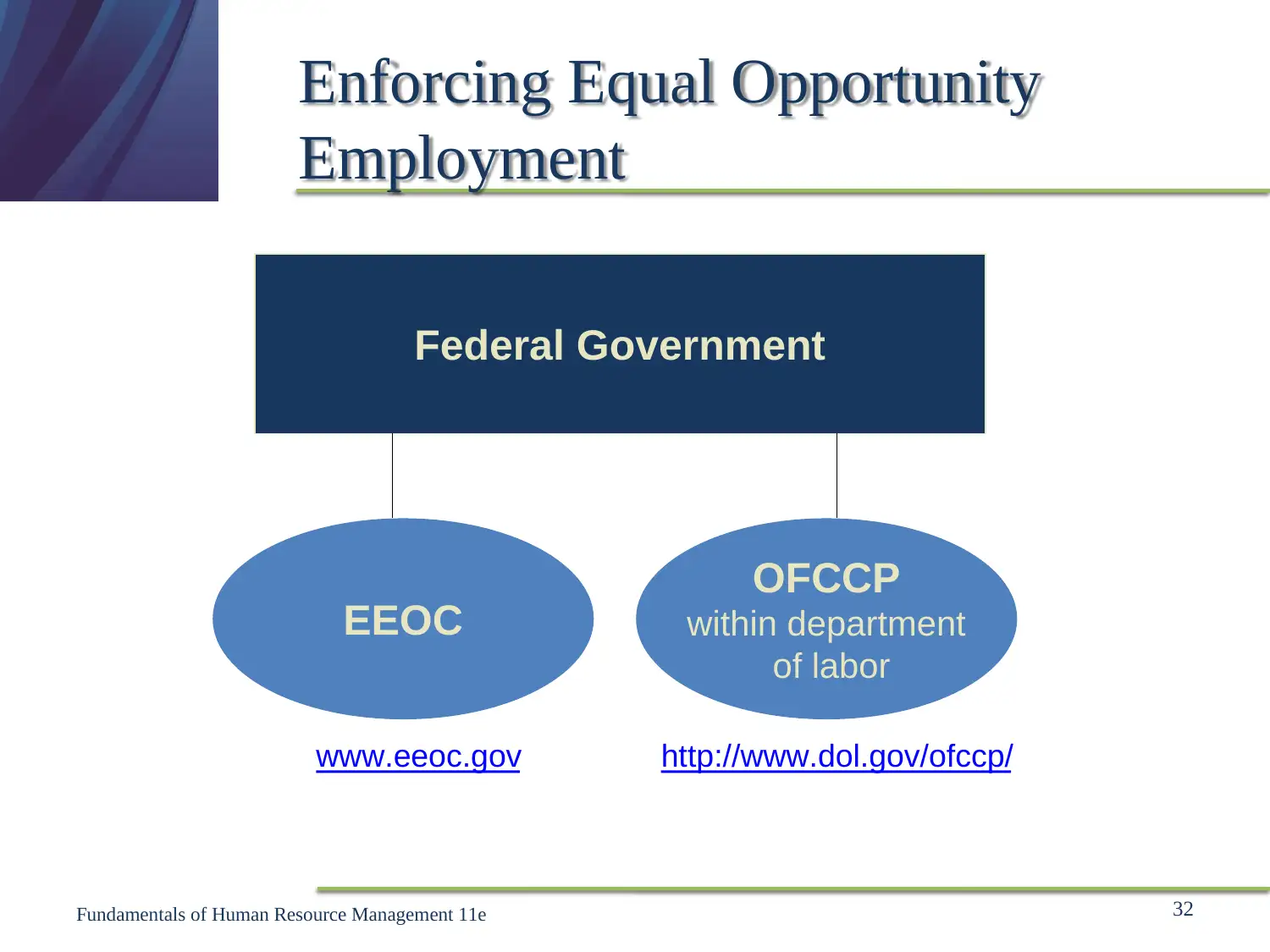
Enforcing Equal Opportunity
Employment
32Fundamentals of Human Resource Management 11e
Federal Government
EEOC OFCCP
within department
of labor
www.eeoc.gov http://www.dol.gov/ofccp/
Employment
32Fundamentals of Human Resource Management 11e
Federal Government
EEOC OFCCP
within department
of labor
www.eeoc.gov http://www.dol.gov/ofccp/
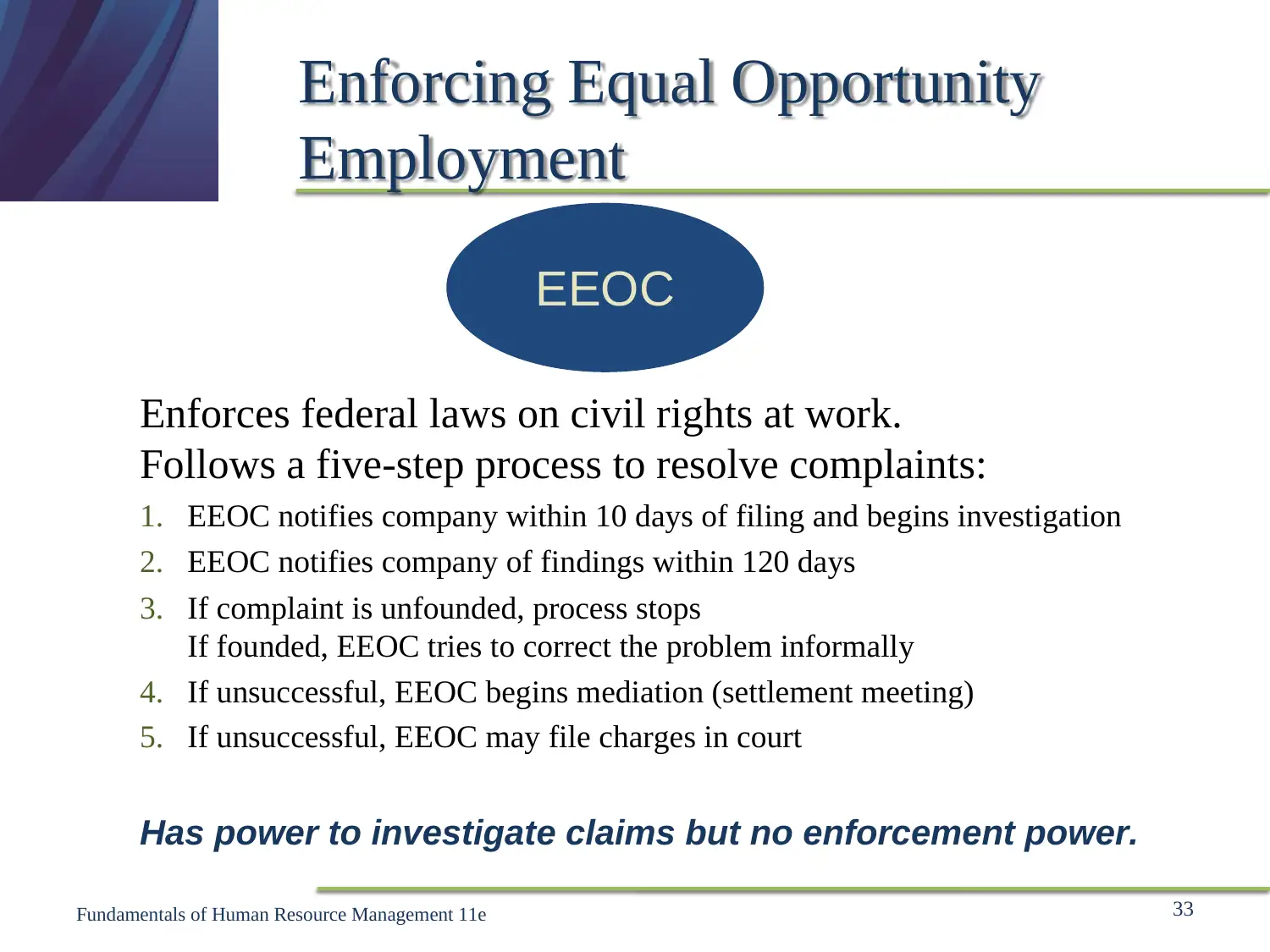
Enforcing Equal Opportunity
Employment
33Fundamentals of Human Resource Management 11e
Enforces federal laws on civil rights at work.
Follows a five-step process to resolve complaints:
1. EEOC notifies company within 10 days of filing and begins investigation
2. EEOC notifies company of findings within 120 days
3. If complaint is unfounded, process stops
If founded, EEOC tries to correct the problem informally
4. If unsuccessful, EEOC begins mediation (settlement meeting)
5. If unsuccessful, EEOC may file charges in court
EEOC
Has power to investigate claims but no enforcement power.
Employment
33Fundamentals of Human Resource Management 11e
Enforces federal laws on civil rights at work.
Follows a five-step process to resolve complaints:
1. EEOC notifies company within 10 days of filing and begins investigation
2. EEOC notifies company of findings within 120 days
3. If complaint is unfounded, process stops
If founded, EEOC tries to correct the problem informally
4. If unsuccessful, EEOC begins mediation (settlement meeting)
5. If unsuccessful, EEOC may file charges in court
EEOC
Has power to investigate claims but no enforcement power.
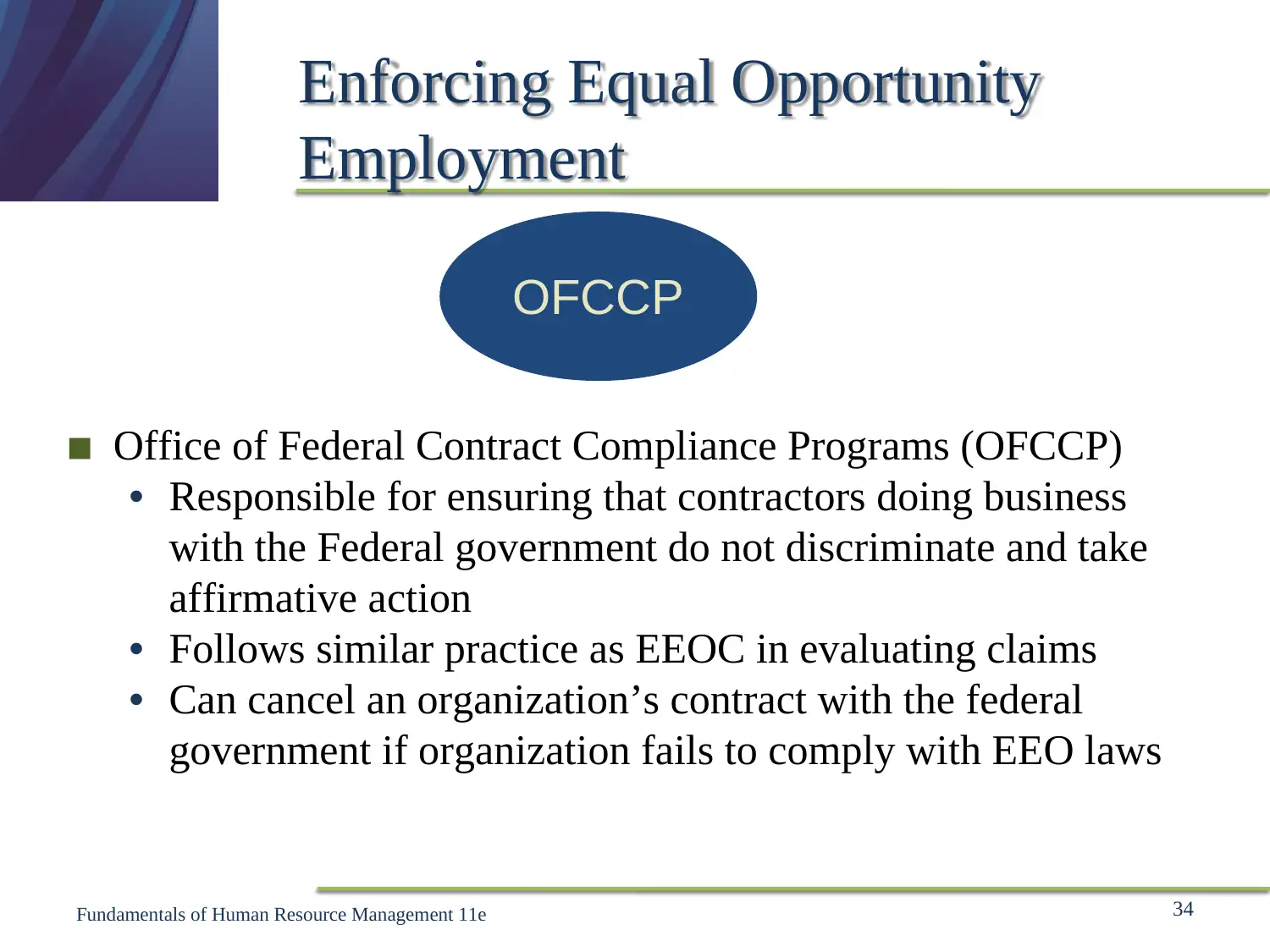
Enforcing Equal Opportunity
Employment
34Fundamentals of Human Resource Management 11e
▪ Office of Federal Contract Compliance Programs (OFCCP)
• Responsible for ensuring that contractors doing business
with the Federal government do not discriminate and take
affirmative action
• Follows similar practice as EEOC in evaluating claims
• Can cancel an organization’s contract with the federal
government if organization fails to comply with EEO laws
OFCCP
Employment
34Fundamentals of Human Resource Management 11e
▪ Office of Federal Contract Compliance Programs (OFCCP)
• Responsible for ensuring that contractors doing business
with the Federal government do not discriminate and take
affirmative action
• Follows similar practice as EEOC in evaluating claims
• Can cancel an organization’s contract with the federal
government if organization fails to comply with EEO laws
OFCCP
Secure Best Marks with AI Grader
Need help grading? Try our AI Grader for instant feedback on your assignments.
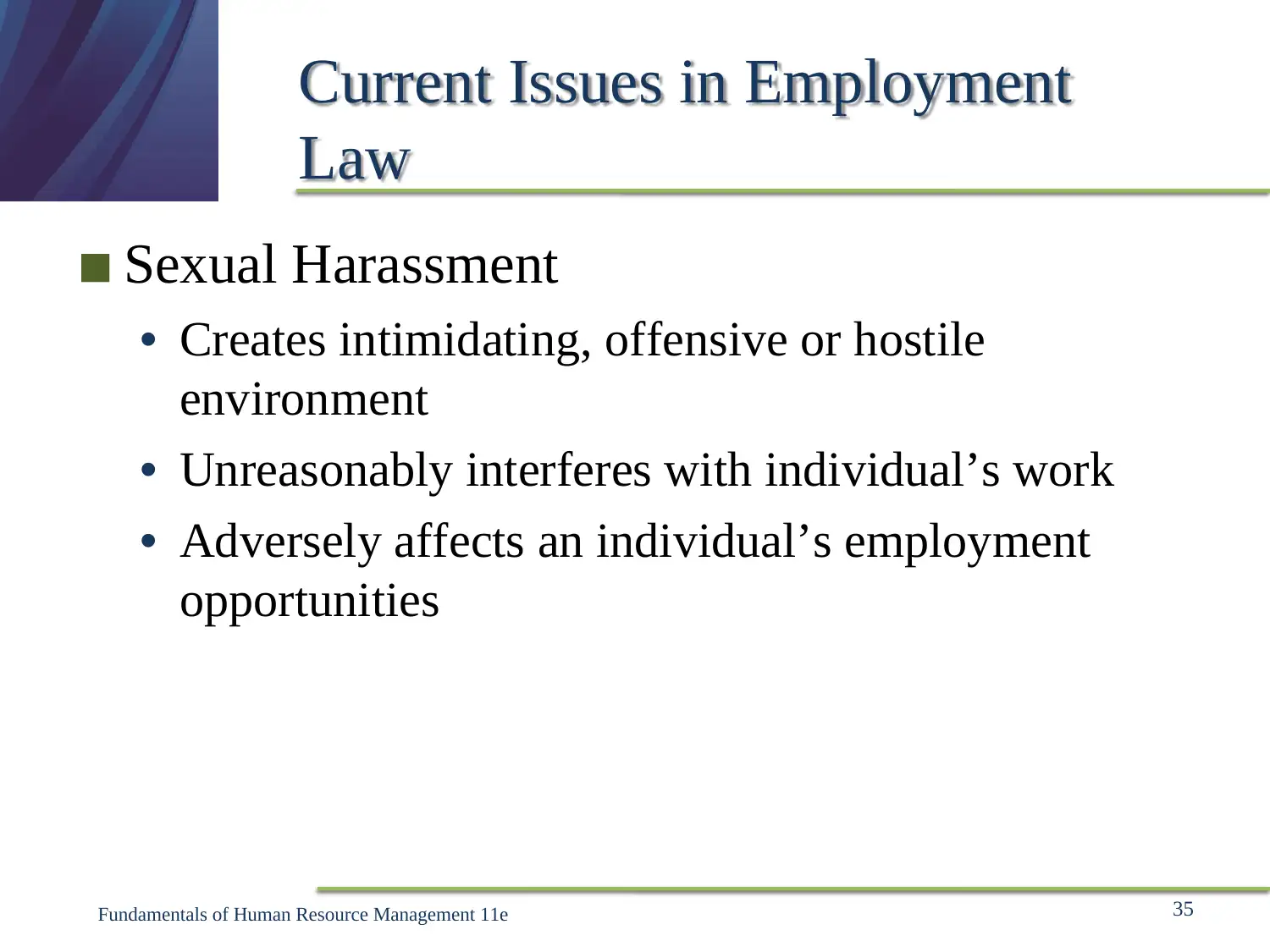
▪ Sexual Harassment
• Creates intimidating, offensive or hostile
environment
• Unreasonably interferes with individual’s work
• Adversely affects an individual’s employment
opportunities
Current Issues in Employment
Law
35Fundamentals of Human Resource Management 11e
• Creates intimidating, offensive or hostile
environment
• Unreasonably interferes with individual’s work
• Adversely affects an individual’s employment
opportunities
Current Issues in Employment
Law
35Fundamentals of Human Resource Management 11e
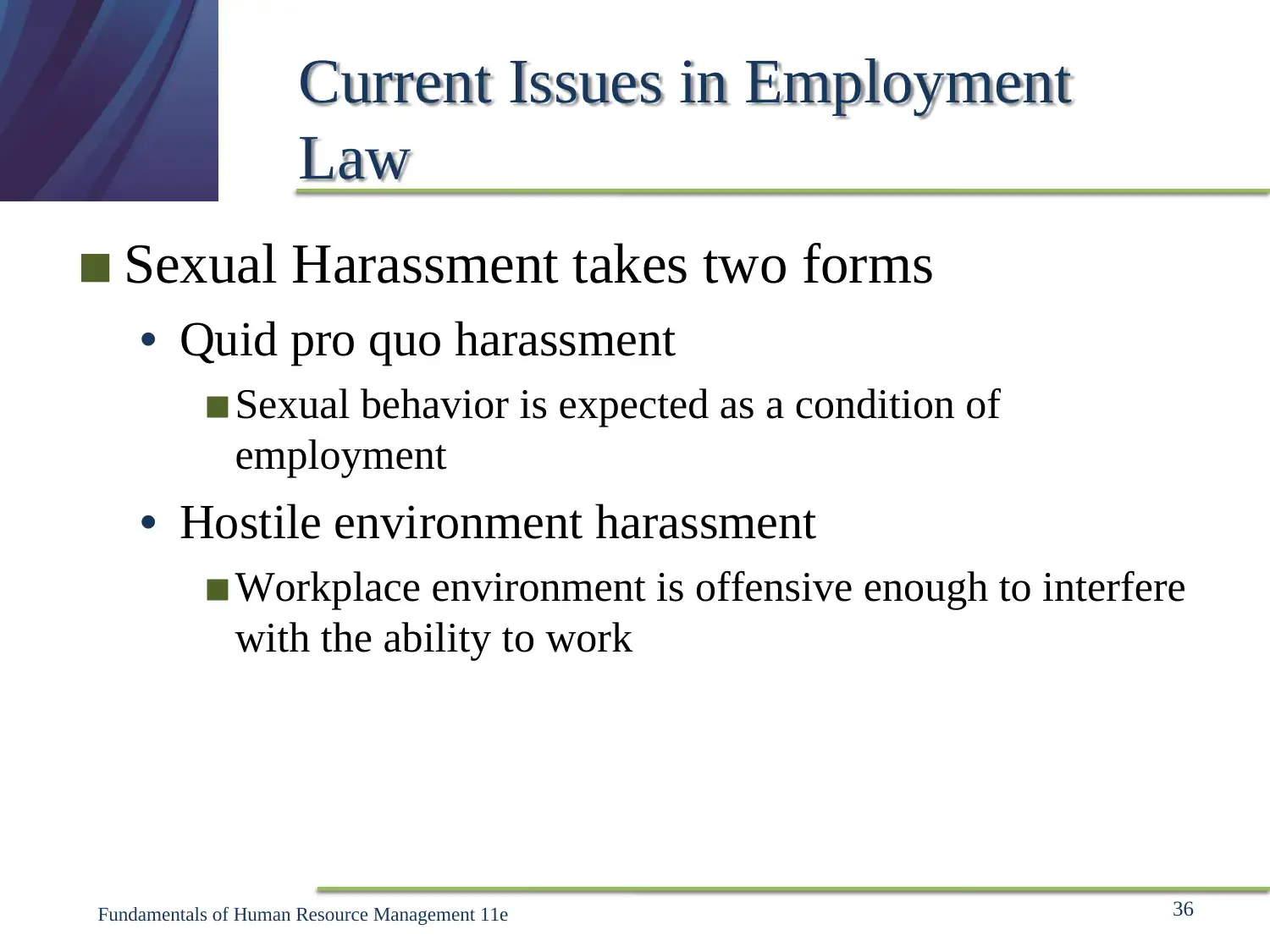
▪ Sexual Harassment takes two forms
• Quid pro quo harassment
▪Sexual behavior is expected as a condition of
employment
• Hostile environment harassment
▪Workplace environment is offensive enough to interfere
with the ability to work
Current Issues in Employment
Law
36Fundamentals of Human Resource Management 11e
• Quid pro quo harassment
▪Sexual behavior is expected as a condition of
employment
• Hostile environment harassment
▪Workplace environment is offensive enough to interfere
with the ability to work
Current Issues in Employment
Law
36Fundamentals of Human Resource Management 11e
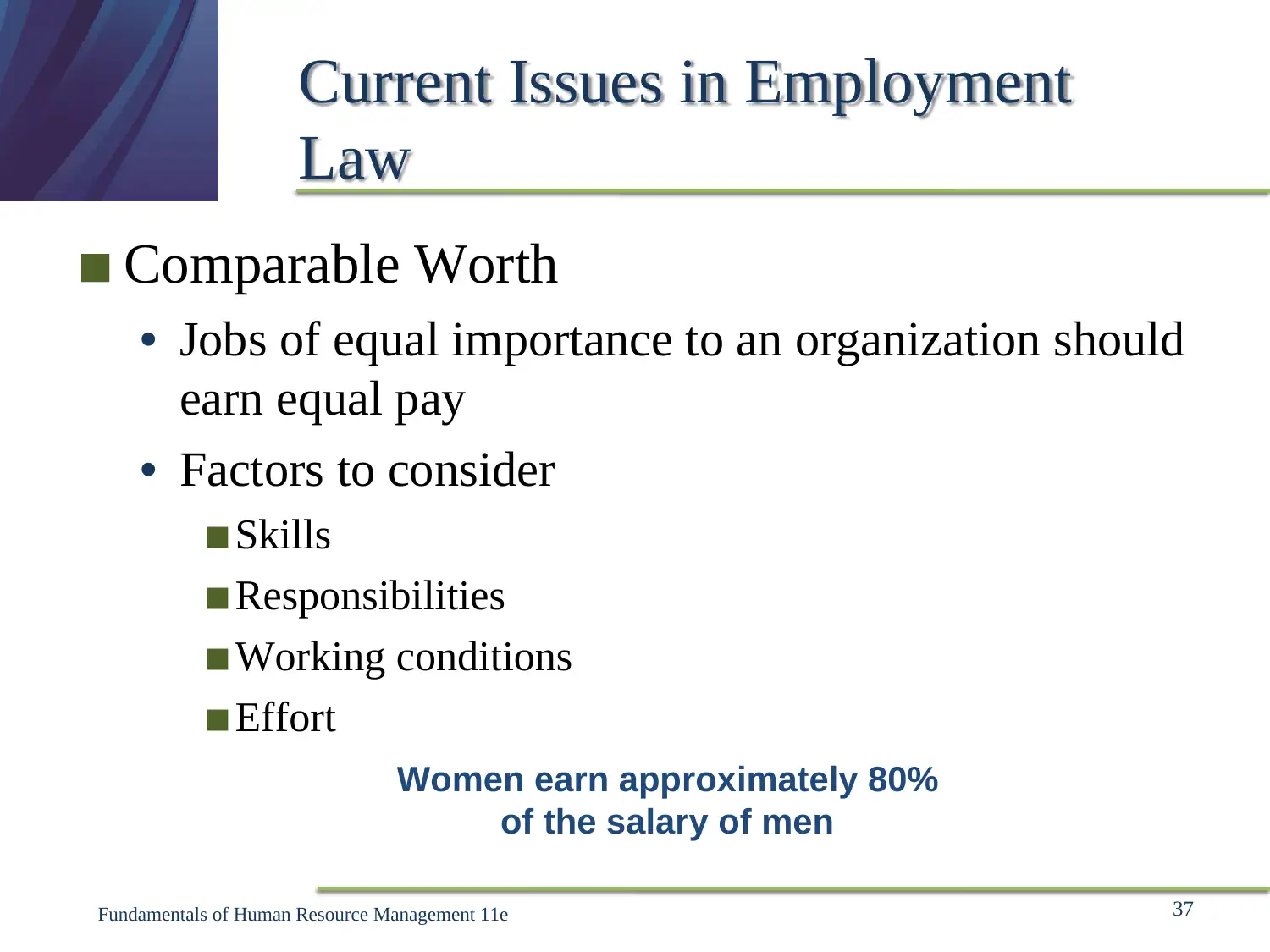
▪ Comparable Worth
• Jobs of equal importance to an organization should
earn equal pay
• Factors to consider
▪Skills
▪Responsibilities
▪Working conditions
▪Effort
Current Issues in Employment
Law
37Fundamentals of Human Resource Management 11e
Women earn approximately 80%
of the salary of men
• Jobs of equal importance to an organization should
earn equal pay
• Factors to consider
▪Skills
▪Responsibilities
▪Working conditions
▪Effort
Current Issues in Employment
Law
37Fundamentals of Human Resource Management 11e
Women earn approximately 80%
of the salary of men
Paraphrase This Document
Need a fresh take? Get an instant paraphrase of this document with our AI Paraphraser
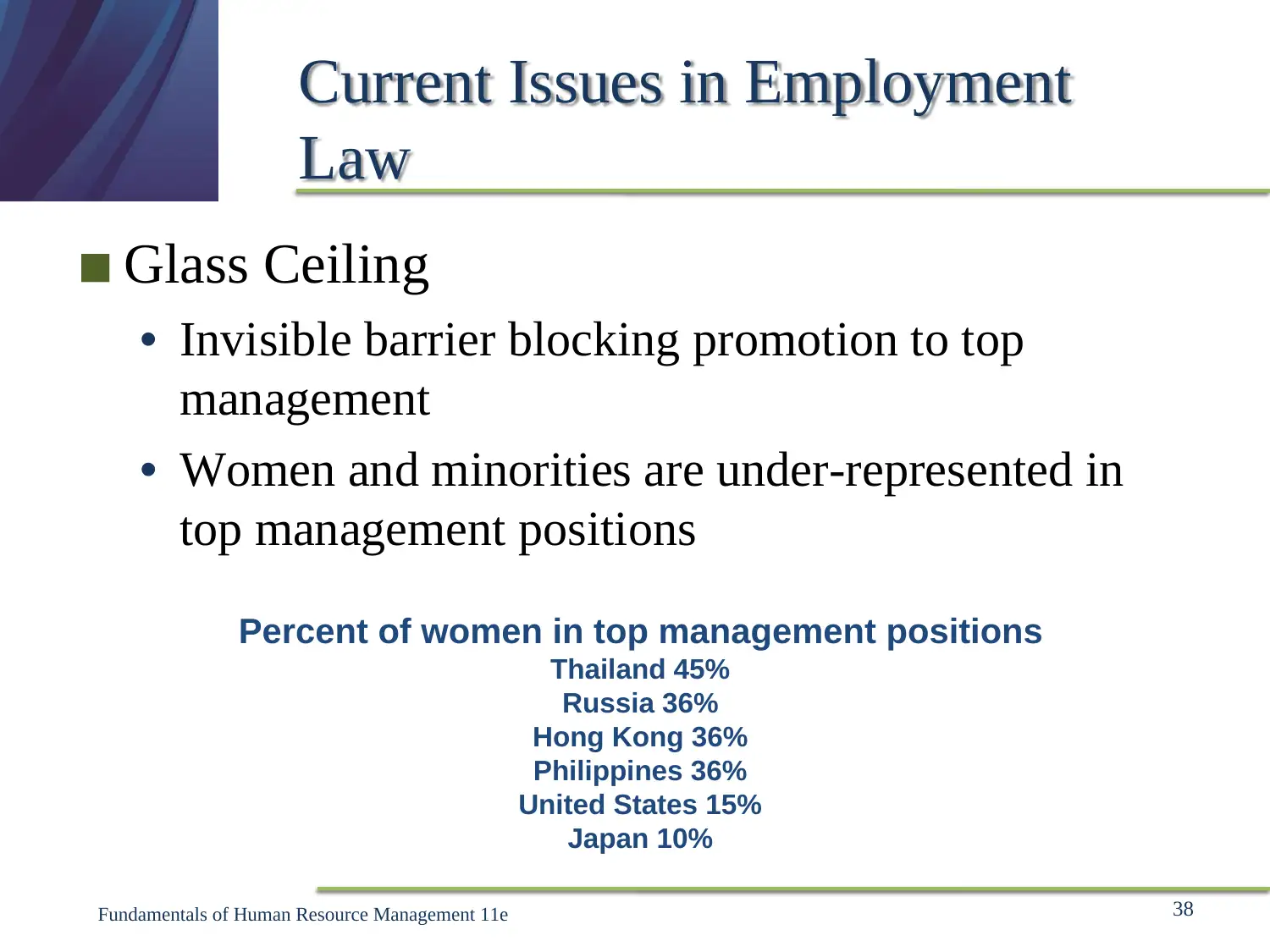
▪ Glass Ceiling
• Invisible barrier blocking promotion to top
management
• Women and minorities are under-represented in
top management positions
Current Issues in Employment
Law
38Fundamentals of Human Resource Management 11e
Percent of women in top management positions
Thailand 45%
Russia 36%
Hong Kong 36%
Philippines 36%
United States 15%
Japan 10%
• Invisible barrier blocking promotion to top
management
• Women and minorities are under-represented in
top management positions
Current Issues in Employment
Law
38Fundamentals of Human Resource Management 11e
Percent of women in top management positions
Thailand 45%
Russia 36%
Hong Kong 36%
Philippines 36%
United States 15%
Japan 10%
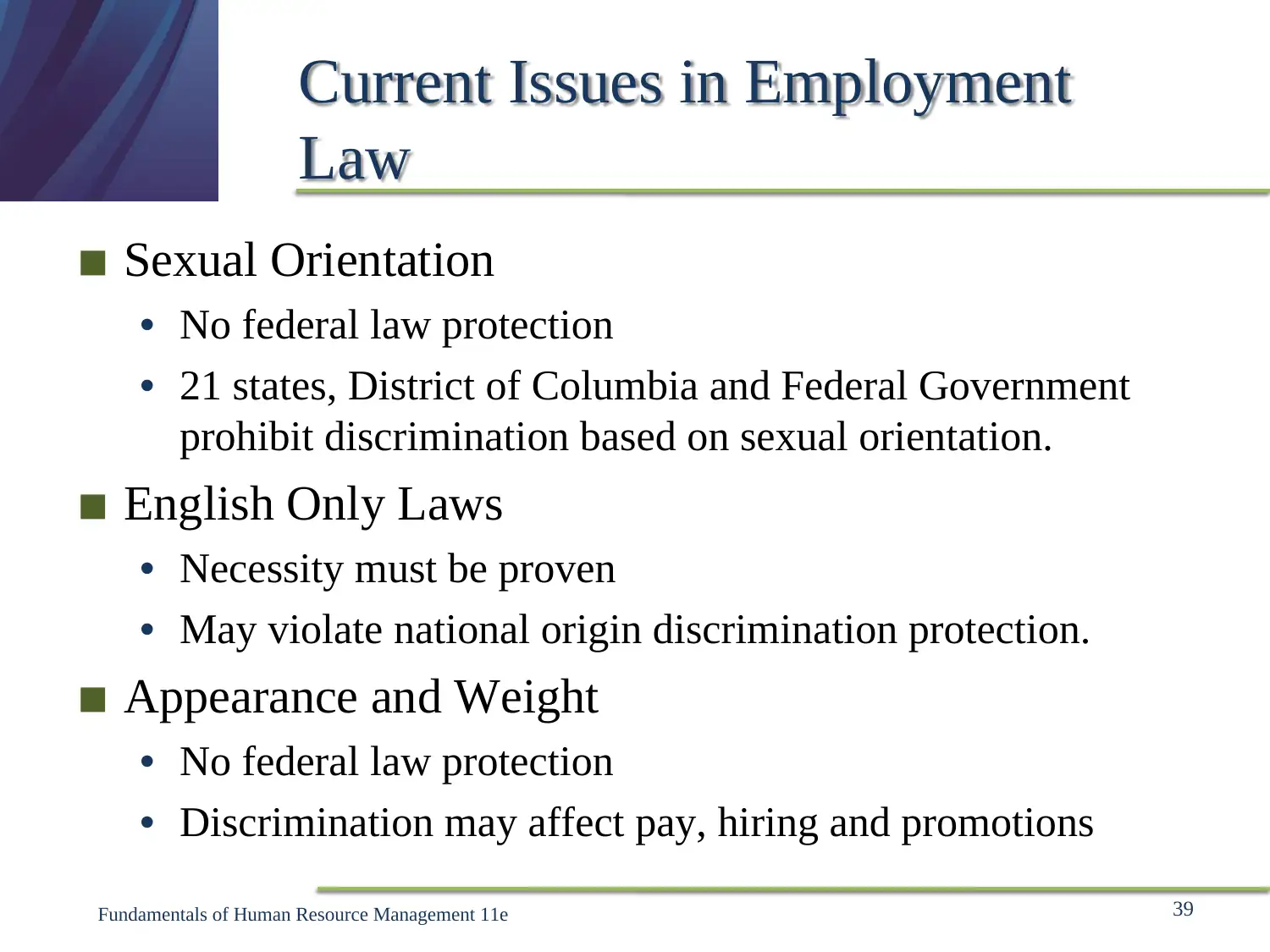
▪ Sexual Orientation
• No federal law protection
• 21 states, District of Columbia and Federal Government
prohibit discrimination based on sexual orientation.
▪ English Only Laws
• Necessity must be proven
• May violate national origin discrimination protection.
▪ Appearance and Weight
• No federal law protection
• Discrimination may affect pay, hiring and promotions
Current Issues in Employment
Law
39Fundamentals of Human Resource Management 11e
• No federal law protection
• 21 states, District of Columbia and Federal Government
prohibit discrimination based on sexual orientation.
▪ English Only Laws
• Necessity must be proven
• May violate national origin discrimination protection.
▪ Appearance and Weight
• No federal law protection
• Discrimination may affect pay, hiring and promotions
Current Issues in Employment
Law
39Fundamentals of Human Resource Management 11e
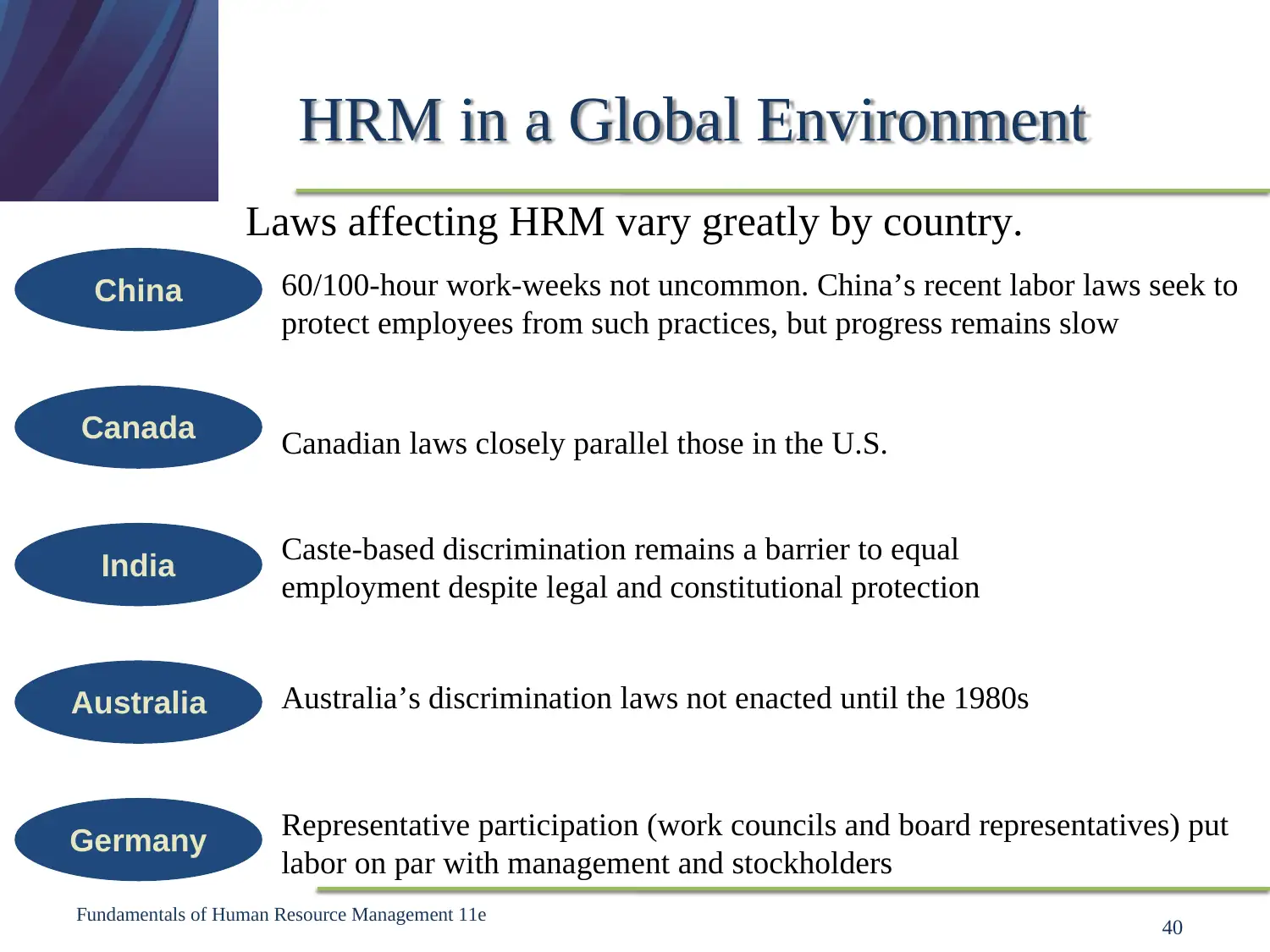
HRM in a Global Environment
40
Fundamentals of Human Resource Management 11e
Australia’s discrimination laws not enacted until the 1980s
Laws affecting HRM vary greatly by country.
60/100-hour work-weeks not uncommon. China’s recent labor laws seek to
protect employees from such practices, but progress remains slow
Representative participation (work councils and board representatives) put
labor on par with management and stockholders
Germany
Australia
India
China
Canada Canadian laws closely parallel those in the U.S.
Caste-based discrimination remains a barrier to equal
employment despite legal and constitutional protection
40
Fundamentals of Human Resource Management 11e
Australia’s discrimination laws not enacted until the 1980s
Laws affecting HRM vary greatly by country.
60/100-hour work-weeks not uncommon. China’s recent labor laws seek to
protect employees from such practices, but progress remains slow
Representative participation (work councils and board representatives) put
labor on par with management and stockholders
Germany
Australia
India
China
Canada Canadian laws closely parallel those in the U.S.
Caste-based discrimination remains a barrier to equal
employment despite legal and constitutional protection
Secure Best Marks with AI Grader
Need help grading? Try our AI Grader for instant feedback on your assignments.
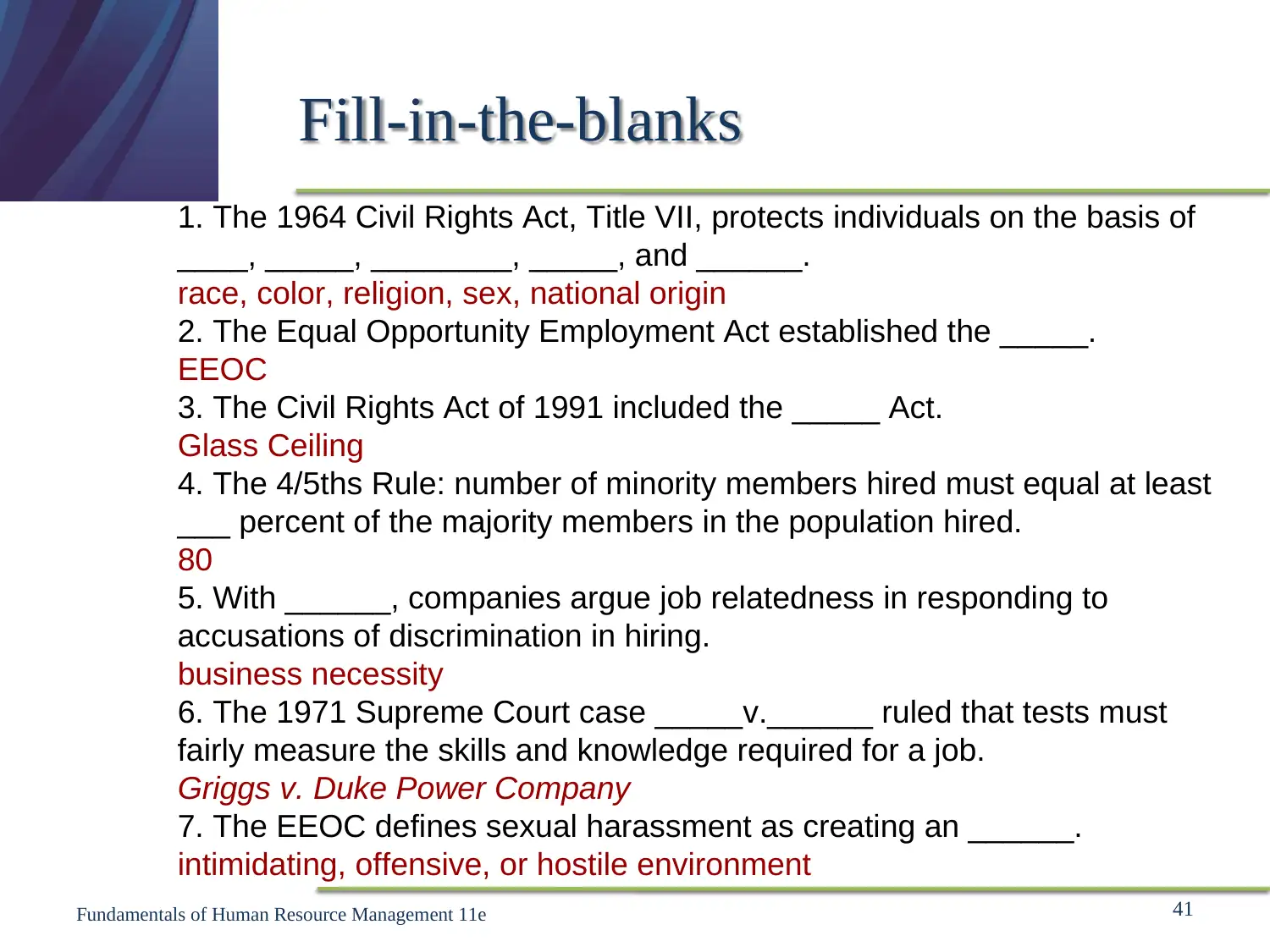
Fill-in-the-blanks
41Fundamentals of Human Resource Management 11e
1. The 1964 Civil Rights Act, Title VII, protects individuals on the basis of
____, _____, ________, _____, and ______.
race, color, religion, sex, national origin
2. The Equal Opportunity Employment Act established the _____.
EEOC
3. The Civil Rights Act of 1991 included the _____ Act.
Glass Ceiling
4. The 4/5ths Rule: number of minority members hired must equal at least
___ percent of the majority members in the population hired.
80
5. With ______, companies argue job relatedness in responding to
accusations of discrimination in hiring.
business necessity
6. The 1971 Supreme Court case _____v.______ ruled that tests must
fairly measure the skills and knowledge required for a job.
Griggs v. Duke Power Company
7. The EEOC defines sexual harassment as creating an ______.
intimidating, offensive, or hostile environment
41Fundamentals of Human Resource Management 11e
1. The 1964 Civil Rights Act, Title VII, protects individuals on the basis of
____, _____, ________, _____, and ______.
race, color, religion, sex, national origin
2. The Equal Opportunity Employment Act established the _____.
EEOC
3. The Civil Rights Act of 1991 included the _____ Act.
Glass Ceiling
4. The 4/5ths Rule: number of minority members hired must equal at least
___ percent of the majority members in the population hired.
80
5. With ______, companies argue job relatedness in responding to
accusations of discrimination in hiring.
business necessity
6. The 1971 Supreme Court case _____v.______ ruled that tests must
fairly measure the skills and knowledge required for a job.
Griggs v. Duke Power Company
7. The EEOC defines sexual harassment as creating an ______.
intimidating, offensive, or hostile environment
1 out of 41
Related Documents
Your All-in-One AI-Powered Toolkit for Academic Success.
+13062052269
info@desklib.com
Available 24*7 on WhatsApp / Email
![[object Object]](/_next/static/media/star-bottom.7253800d.svg)
Unlock your academic potential
© 2024 | Zucol Services PVT LTD | All rights reserved.





